
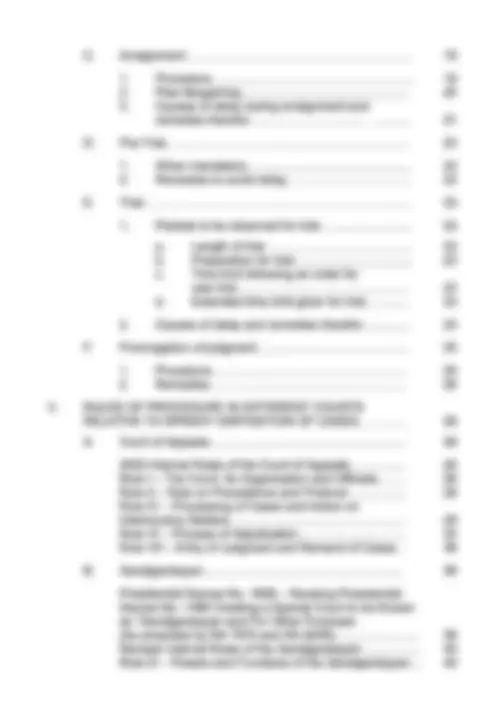
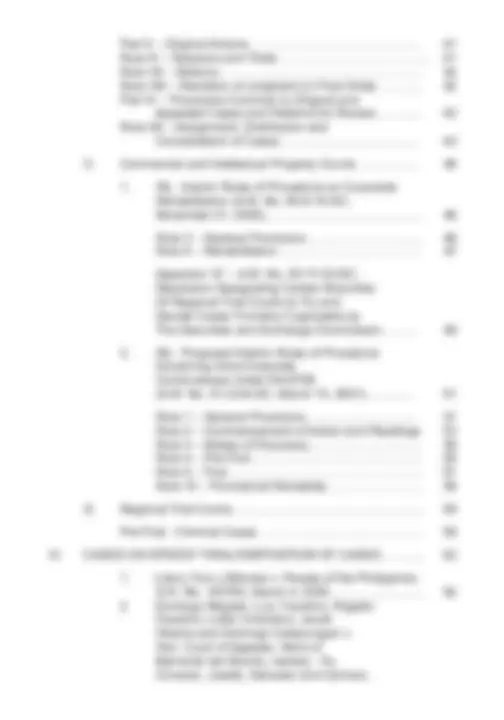
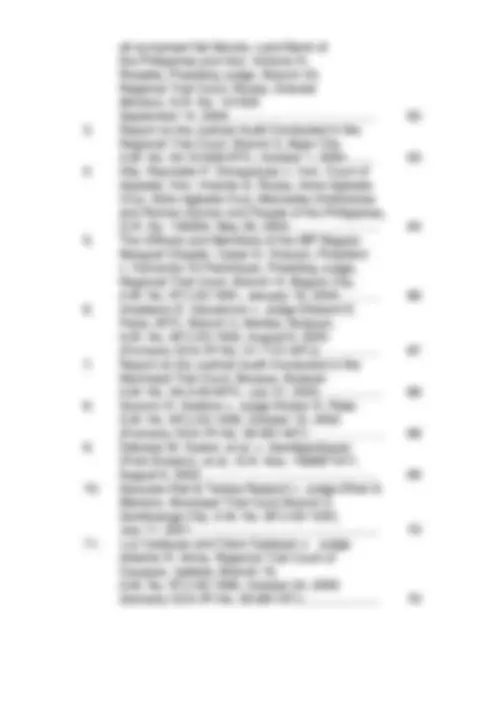
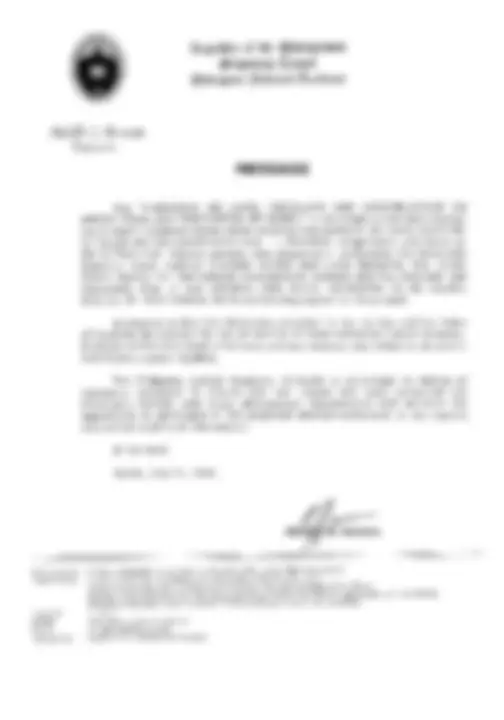
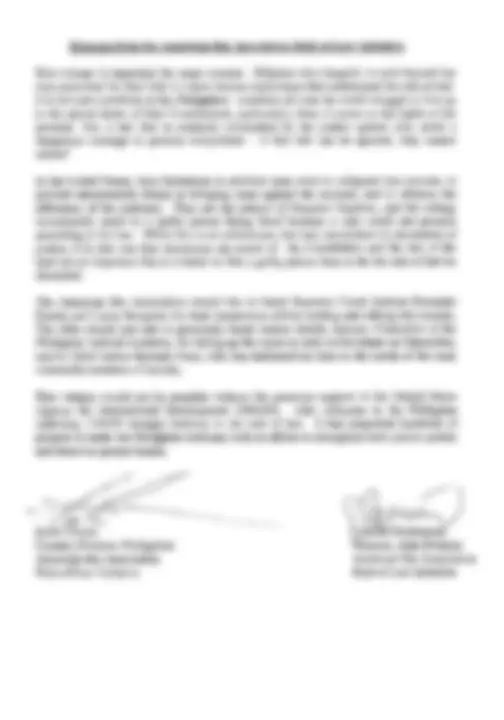
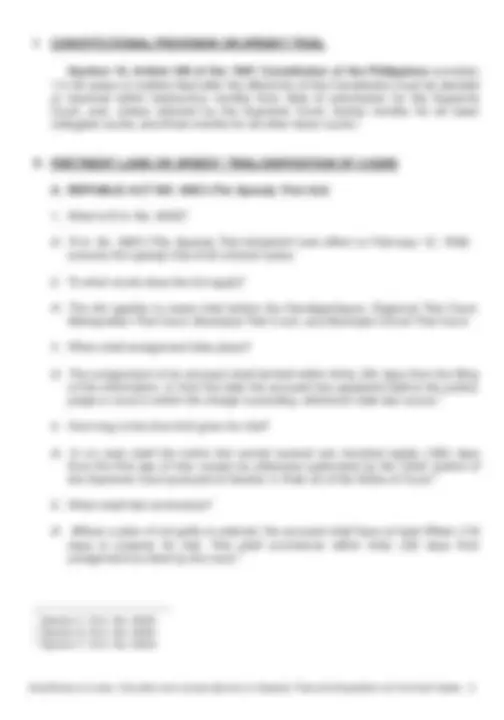
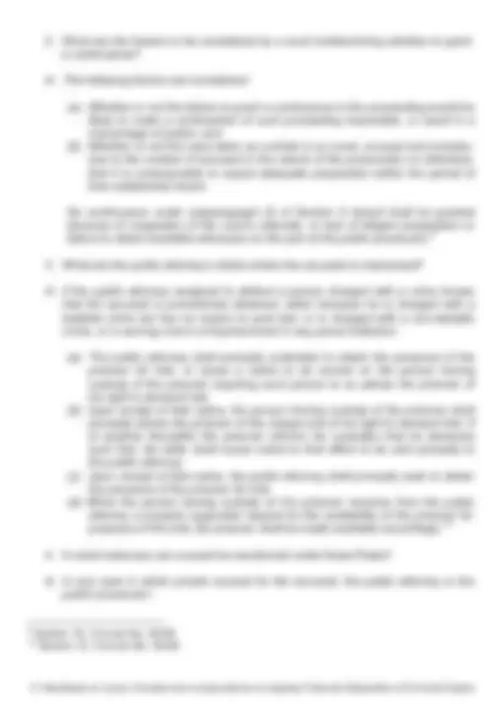
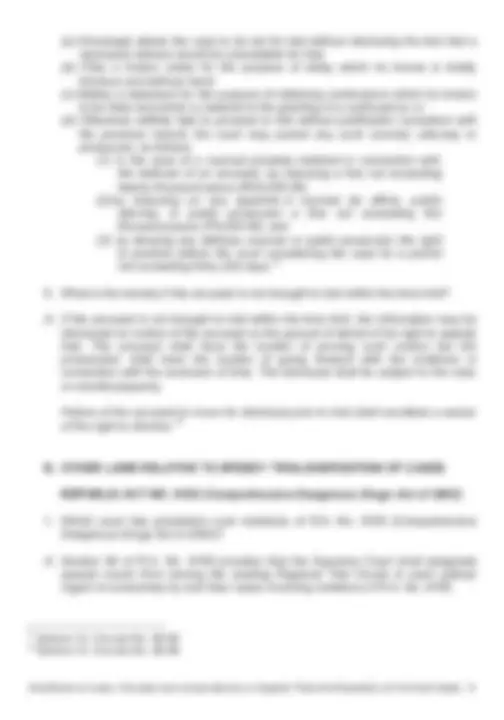
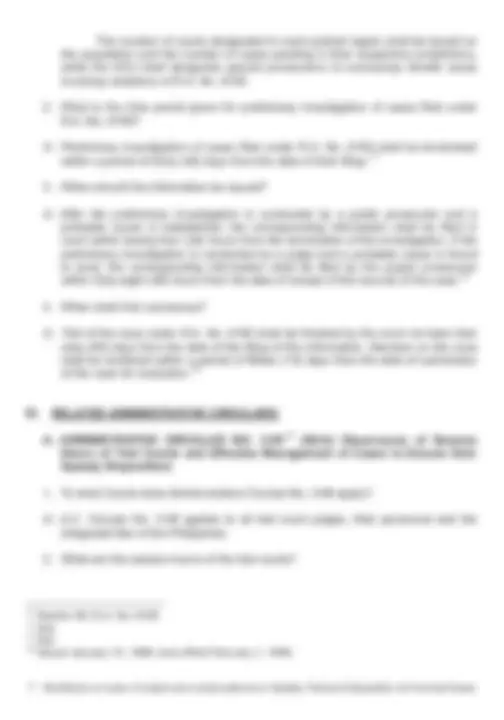
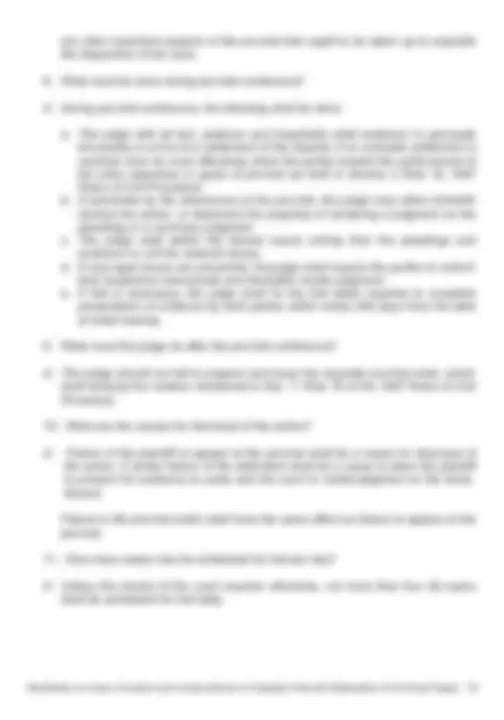
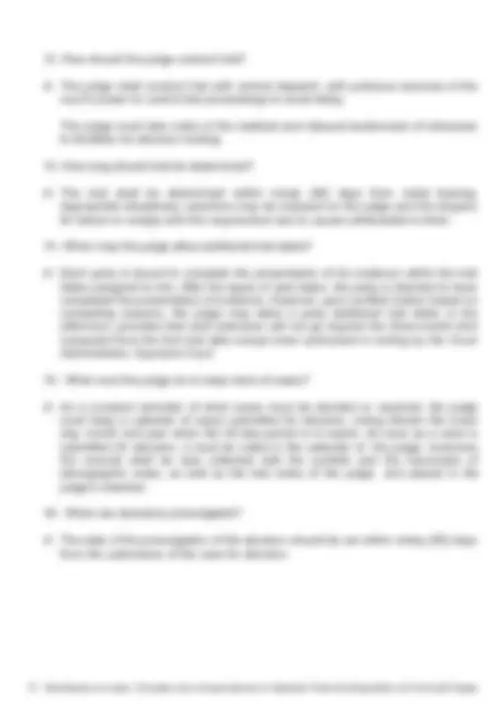
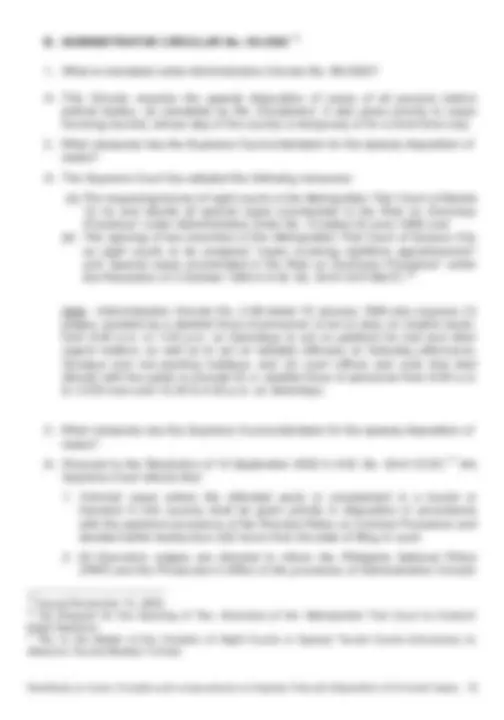
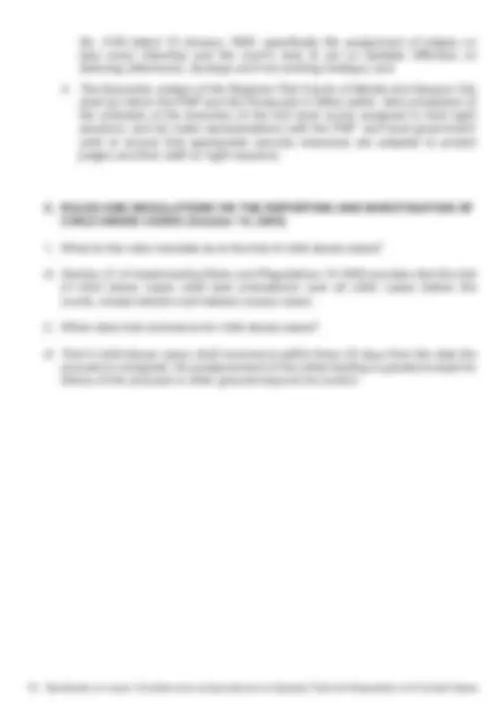
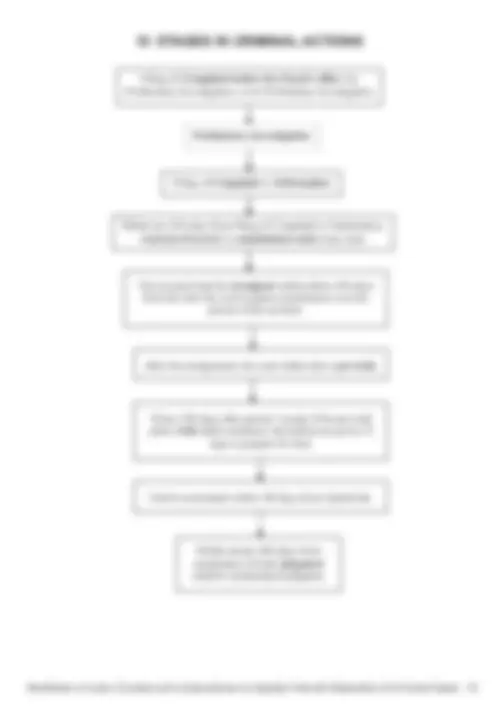
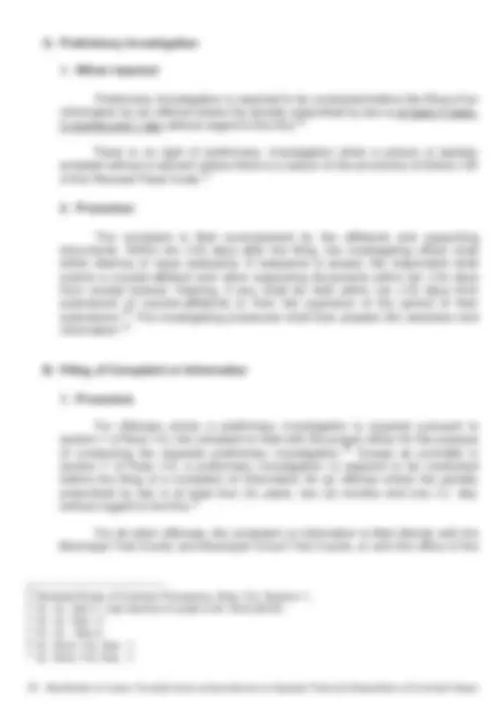
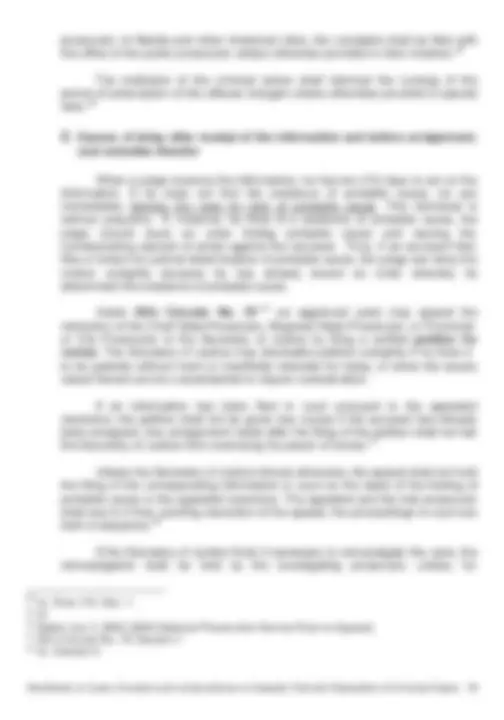
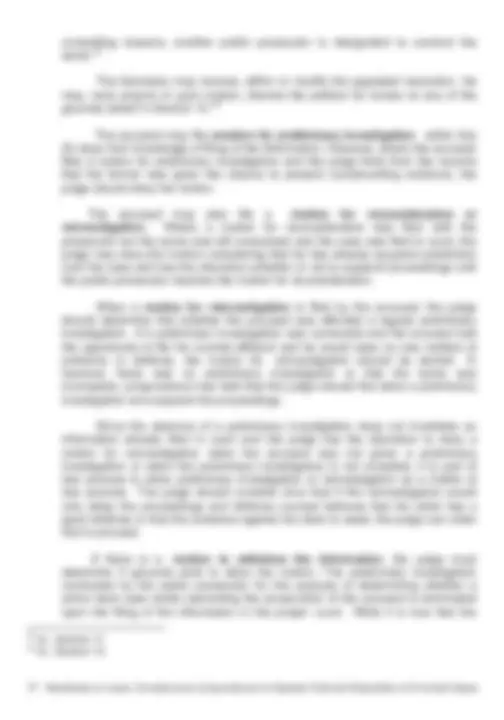
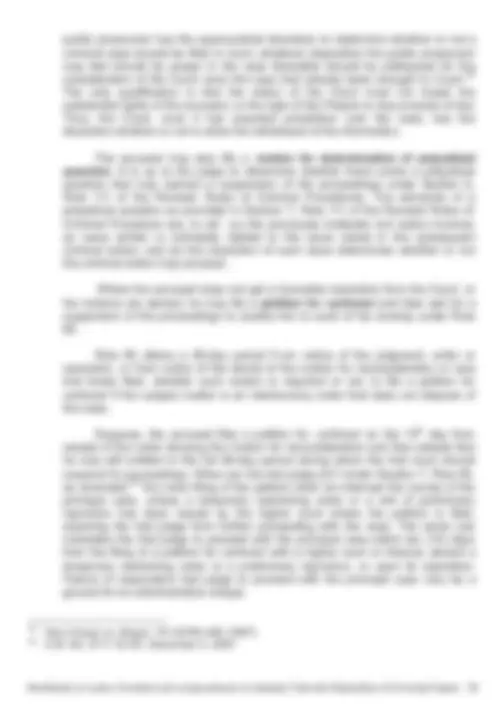
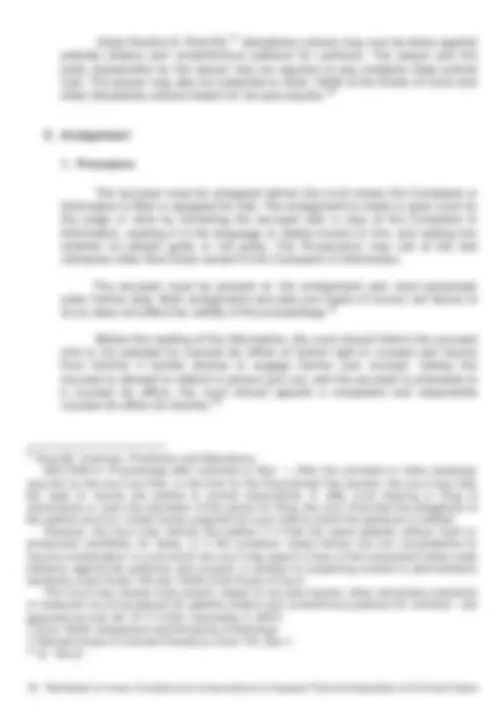
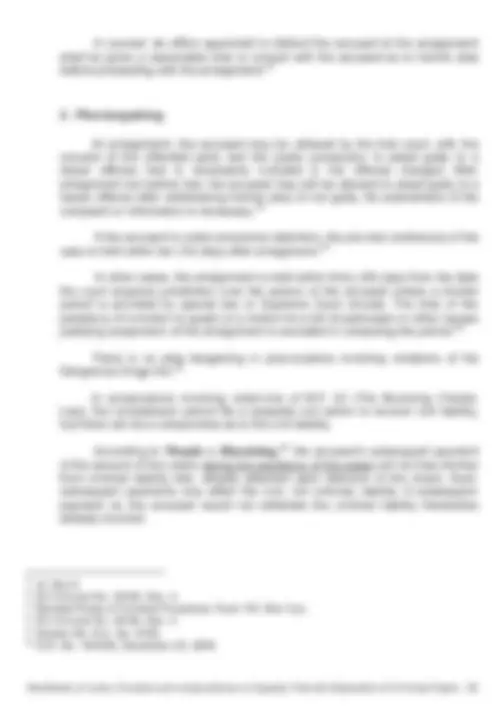
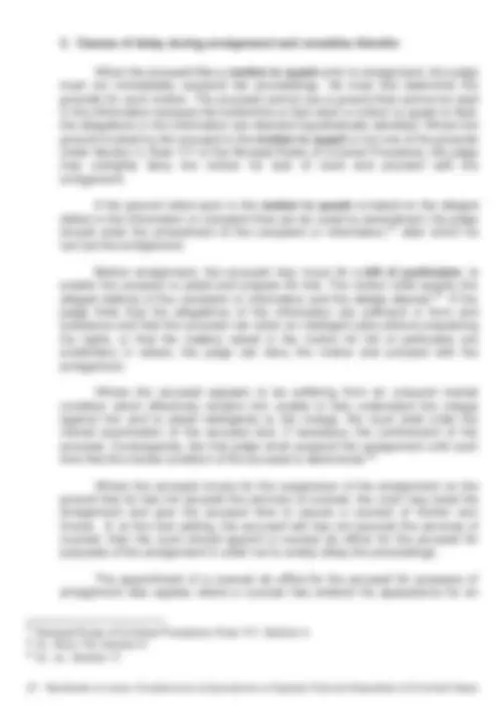
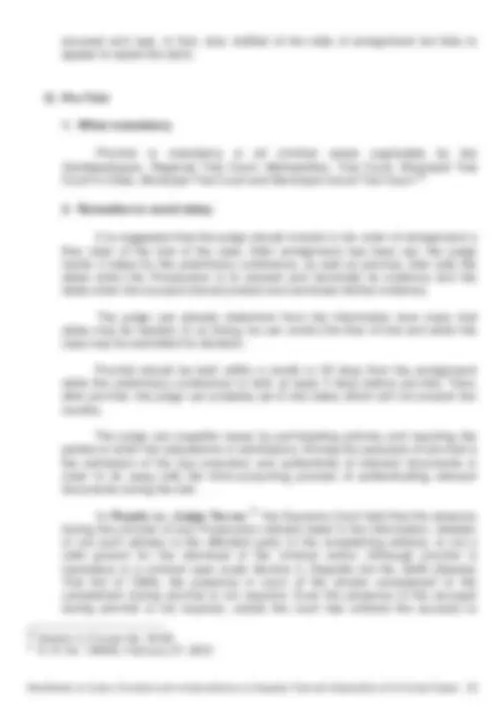
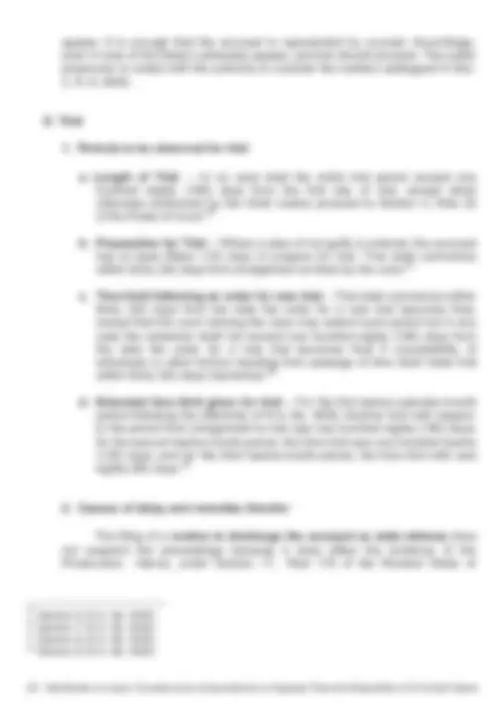
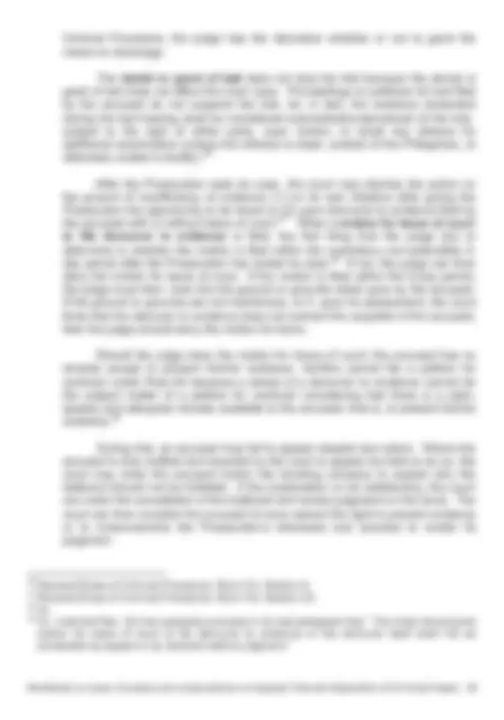
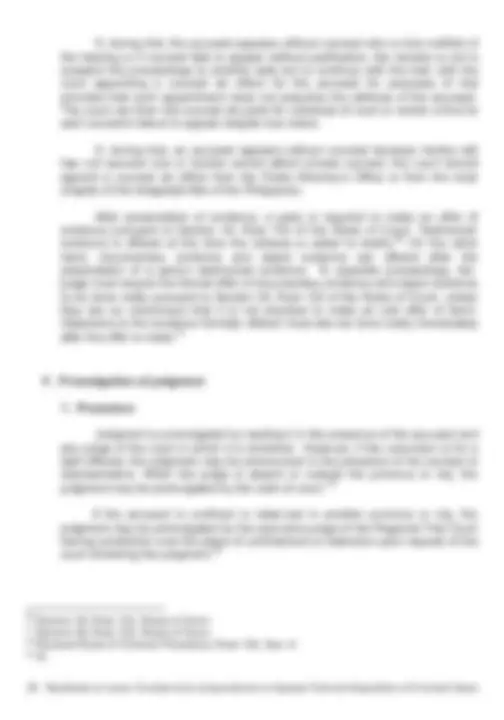
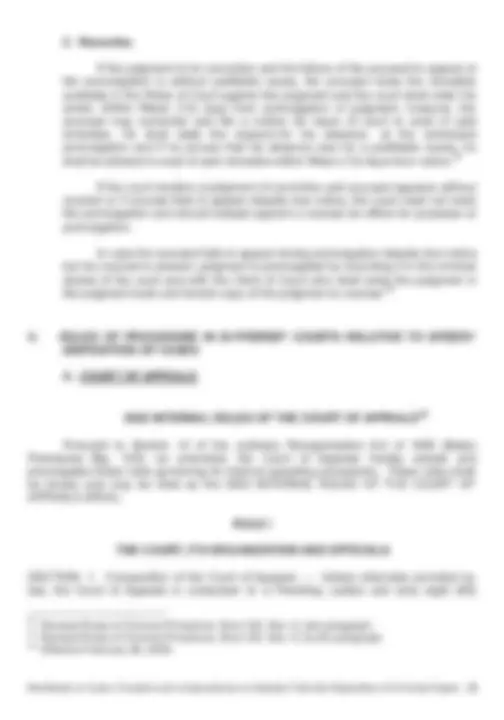
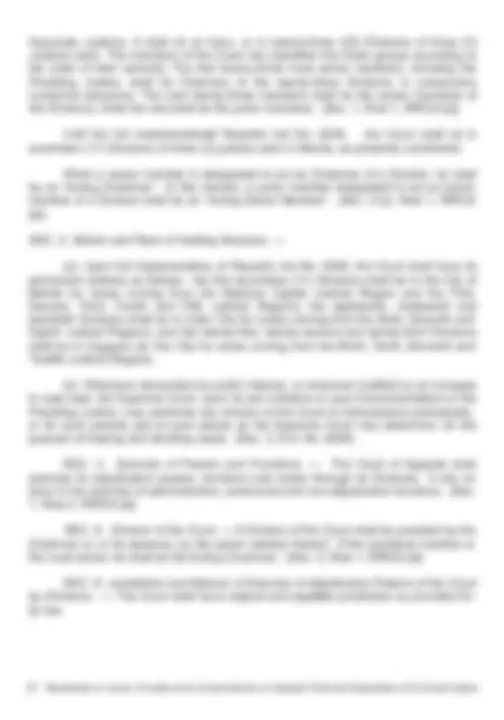
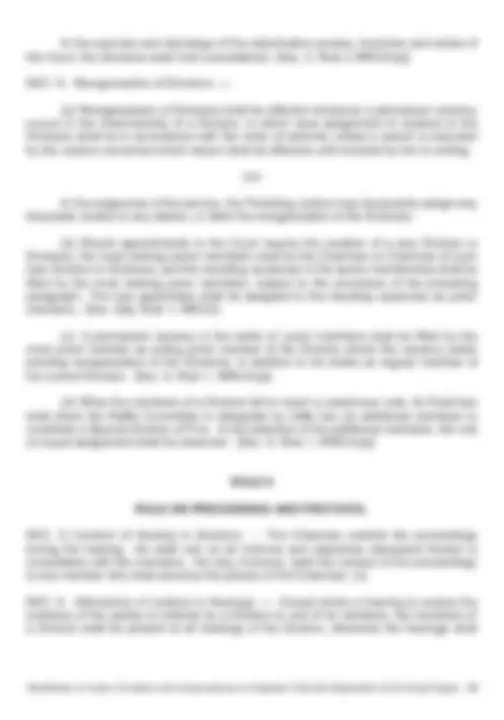
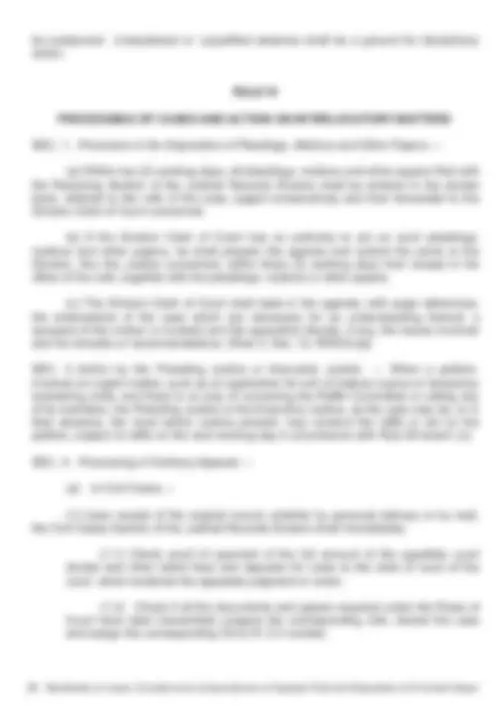
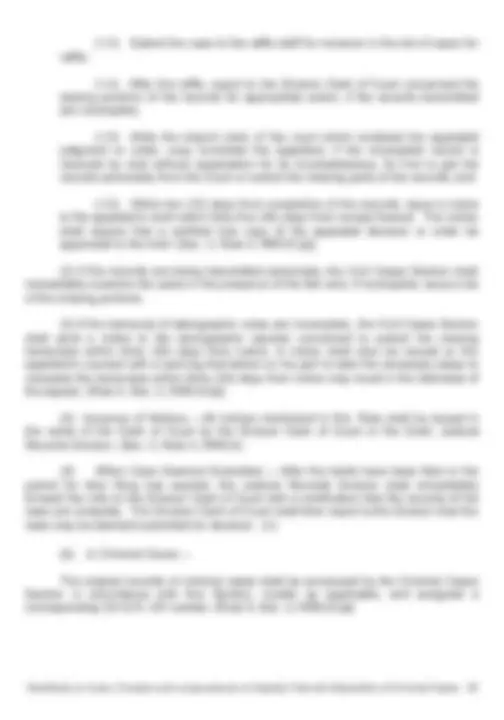
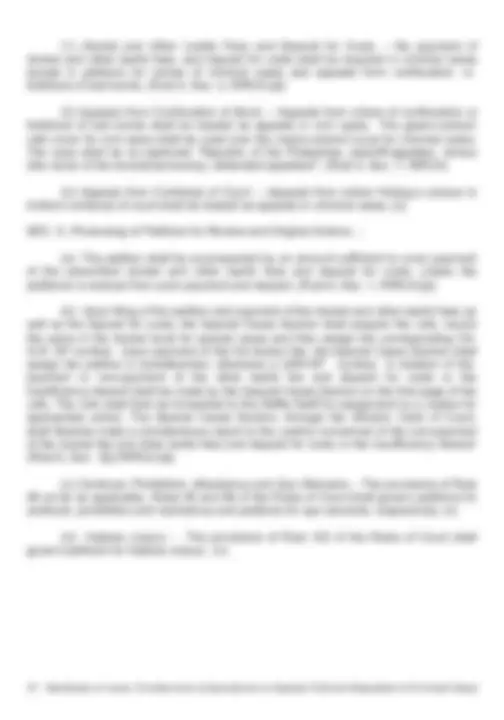
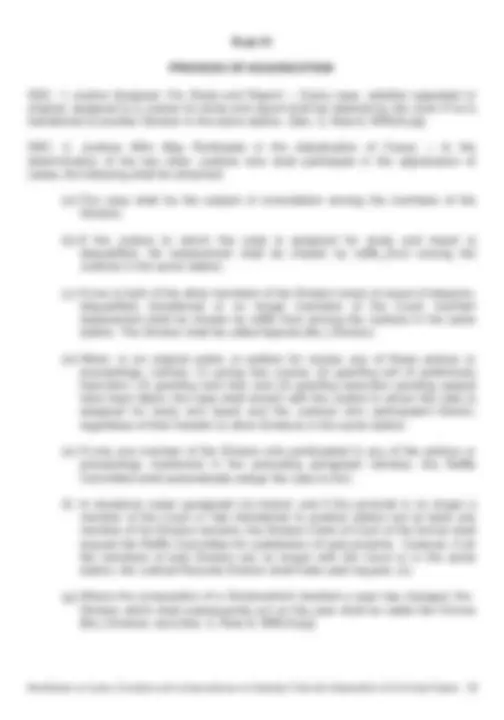
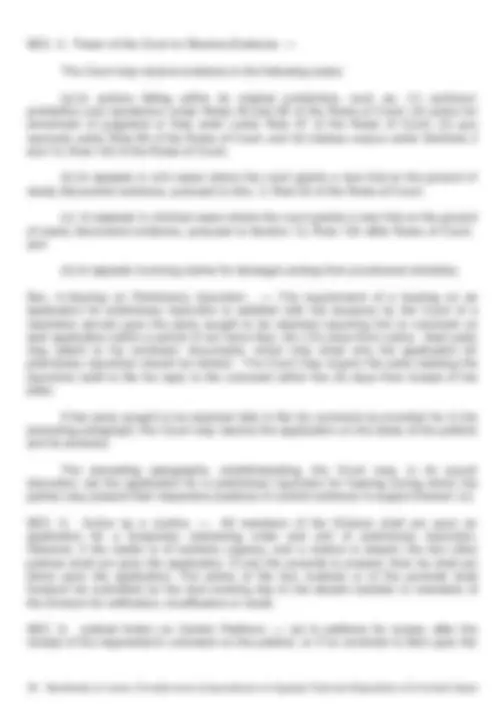
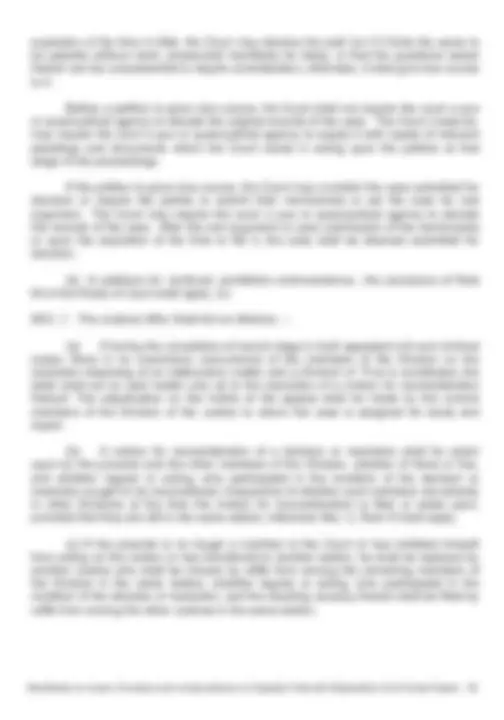
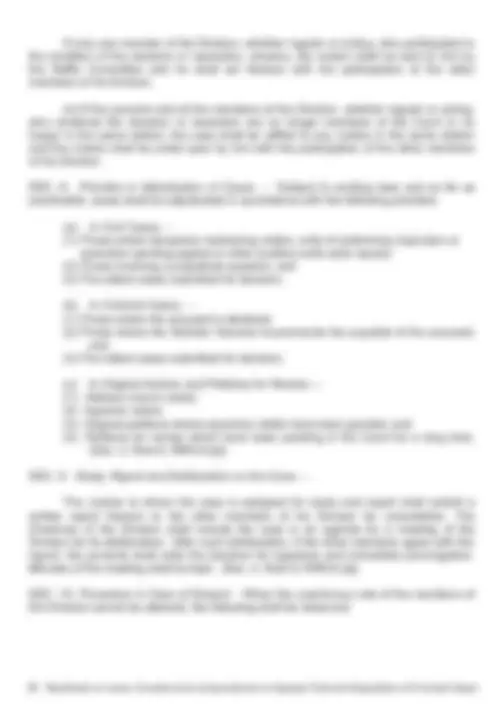
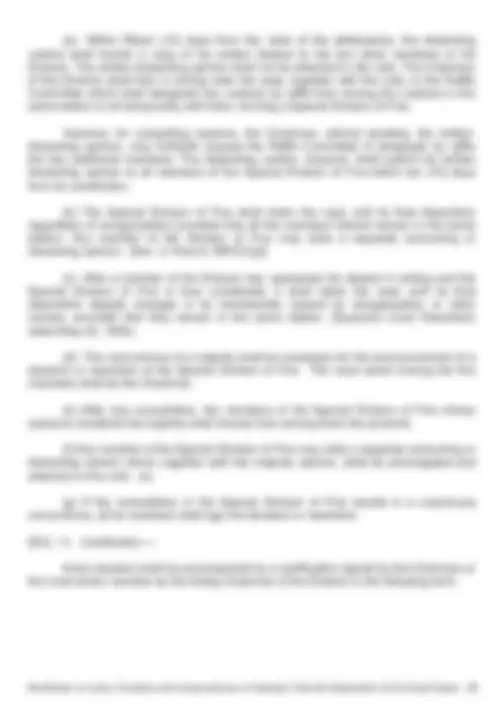
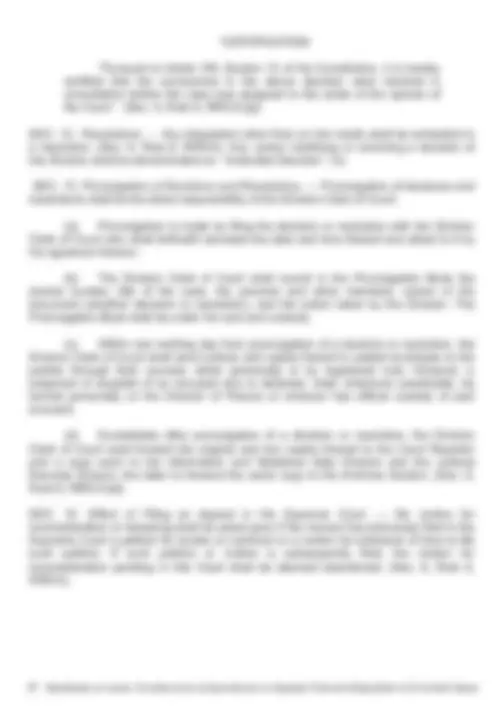
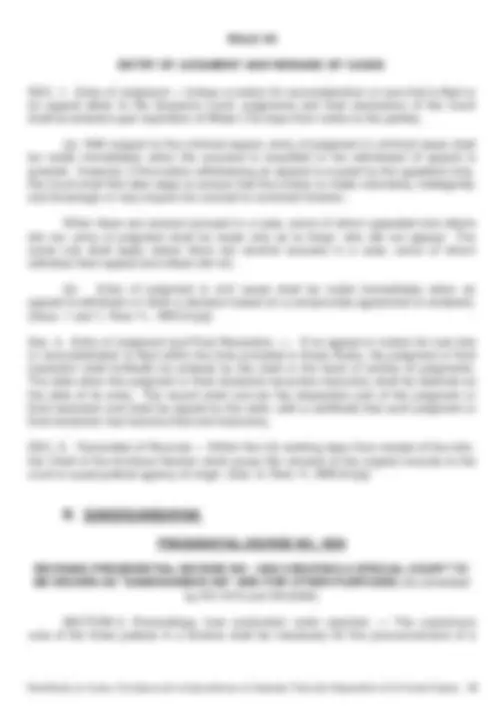
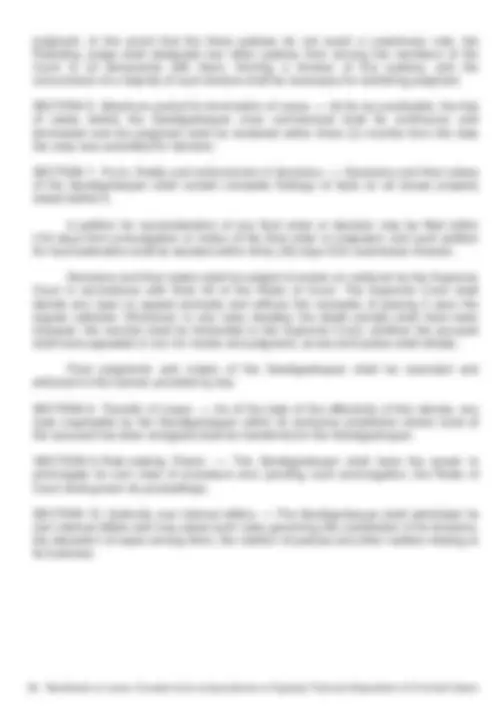
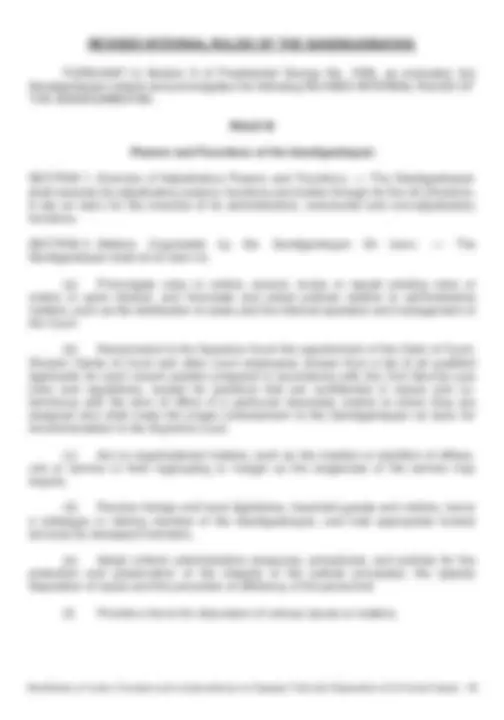
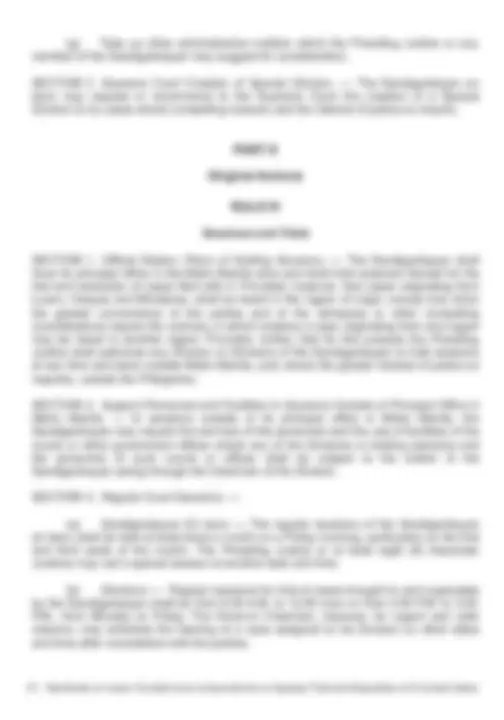
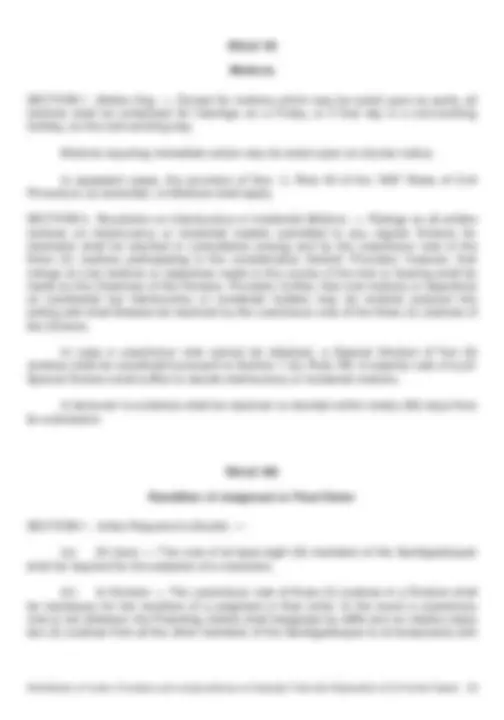
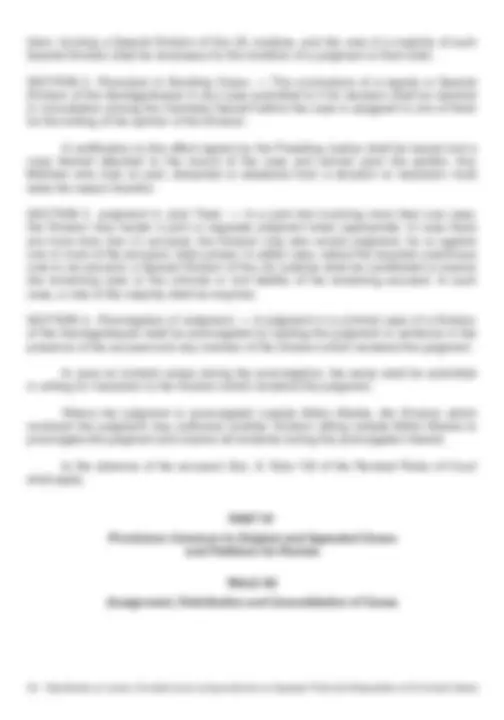
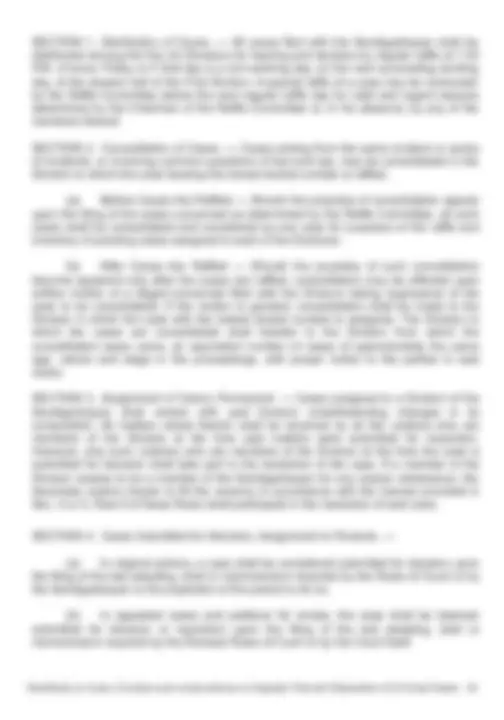
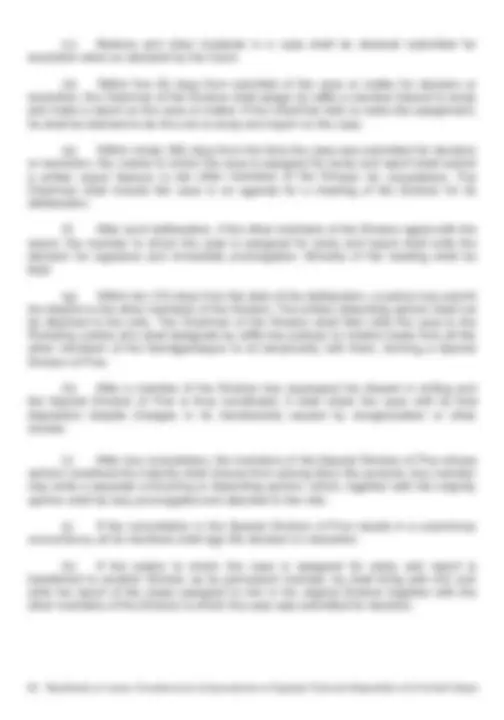
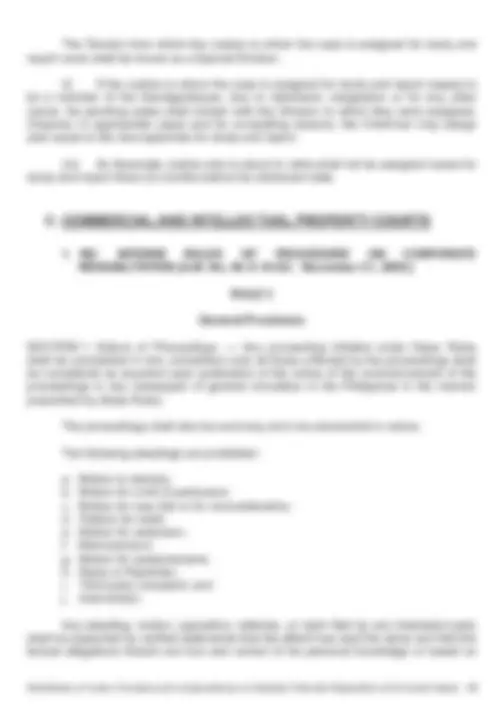
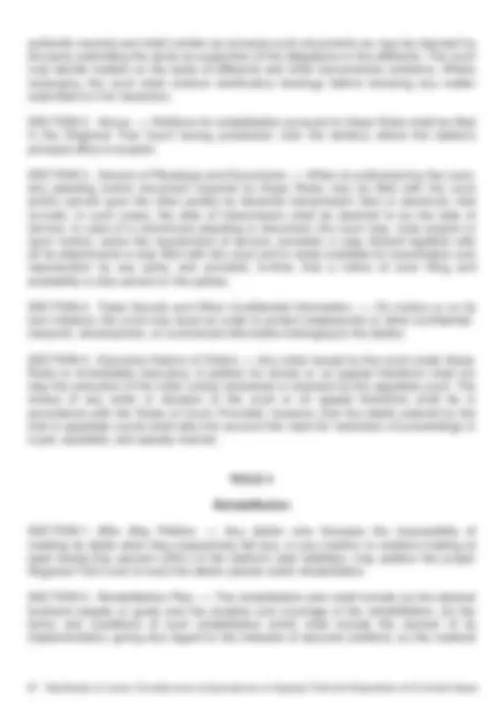
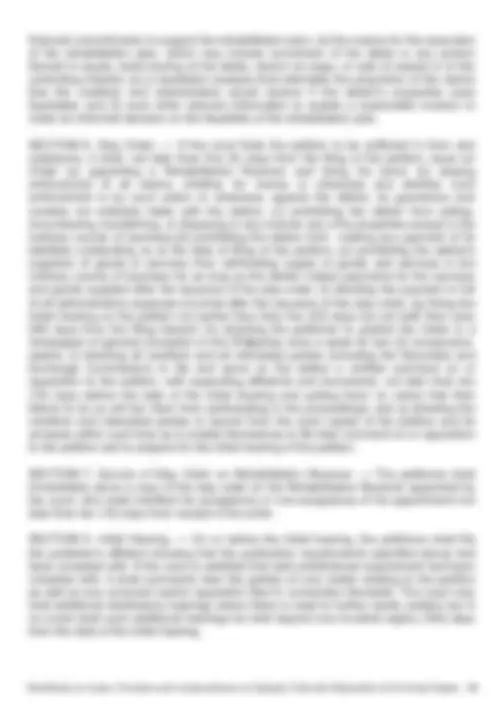
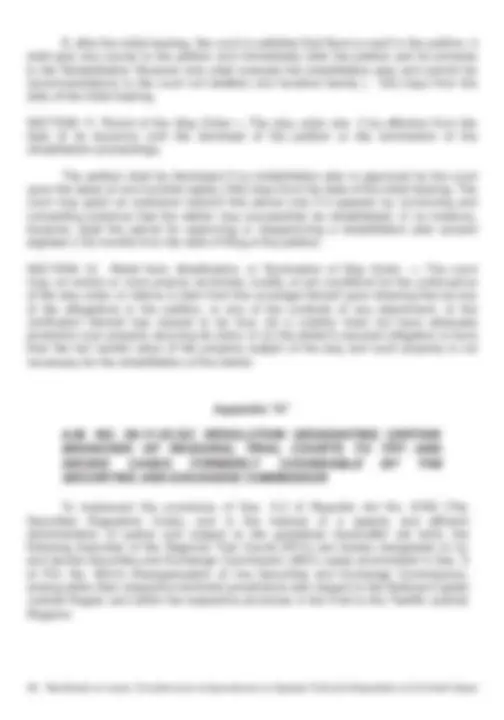
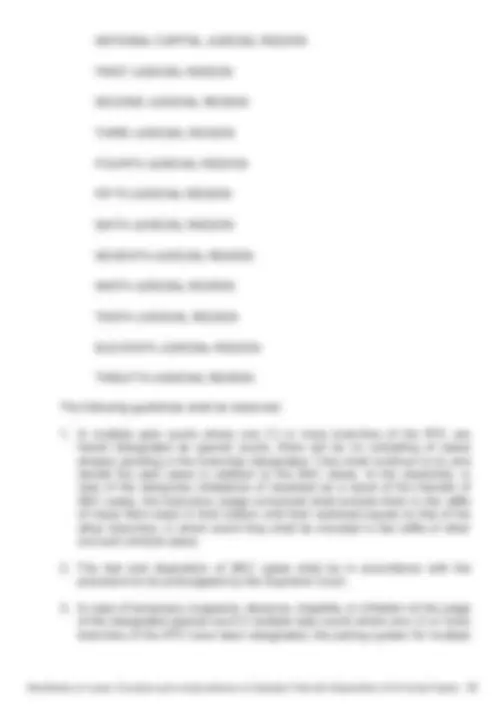
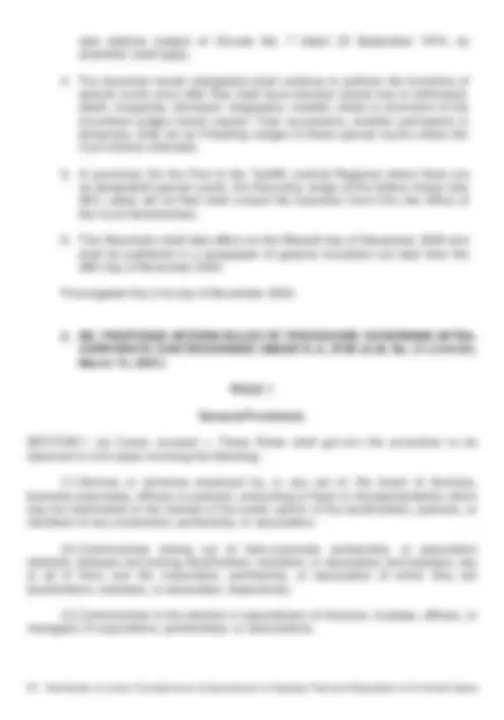
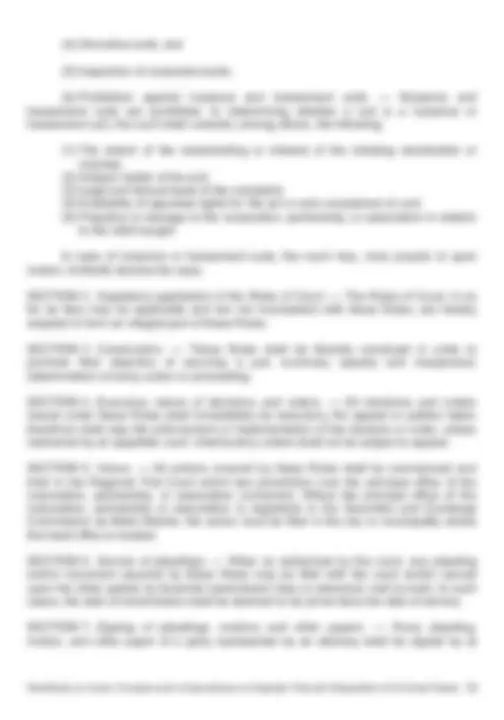
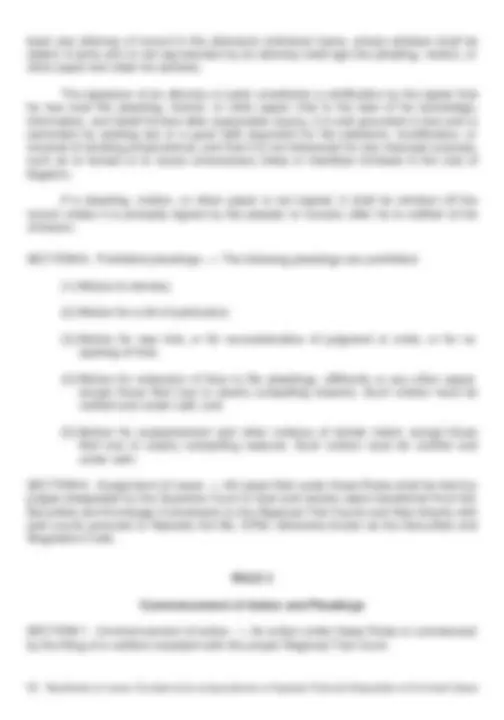
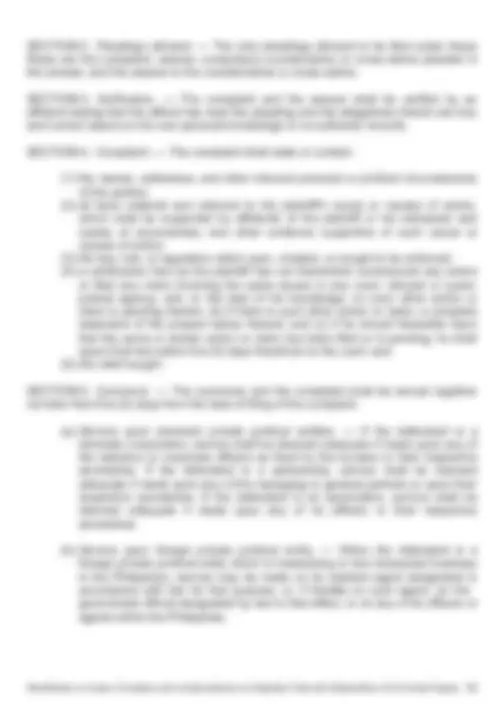
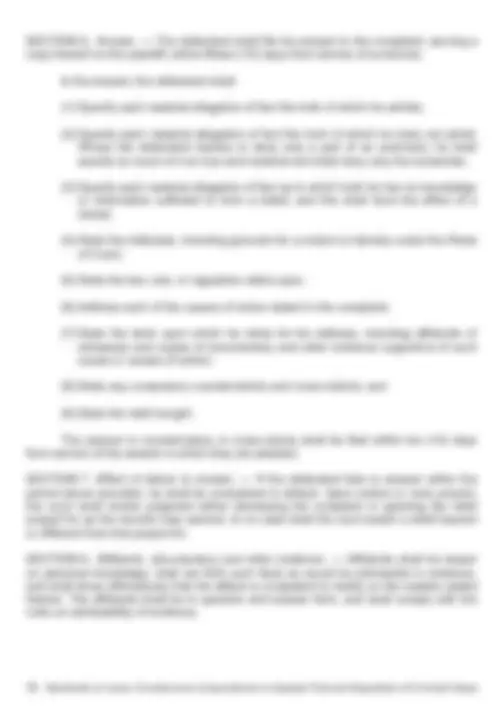
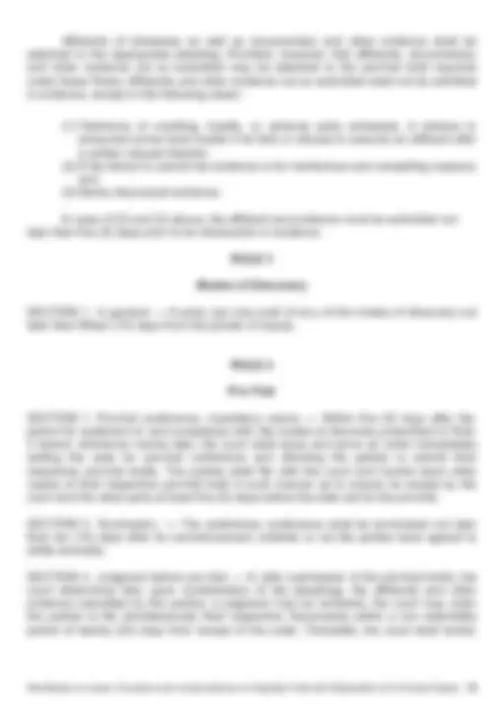
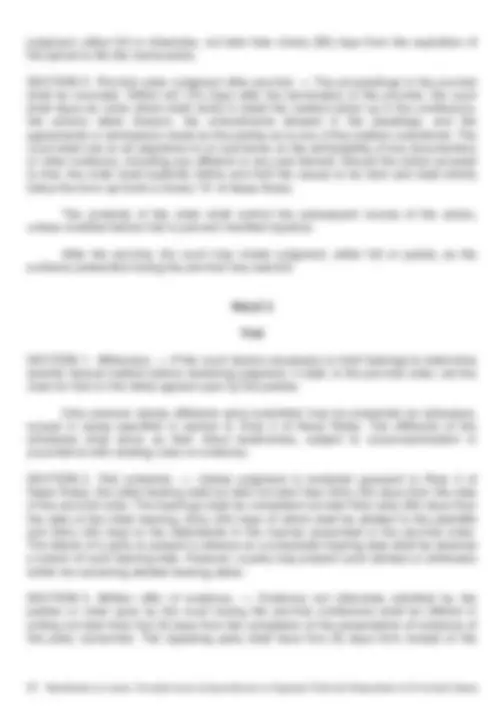
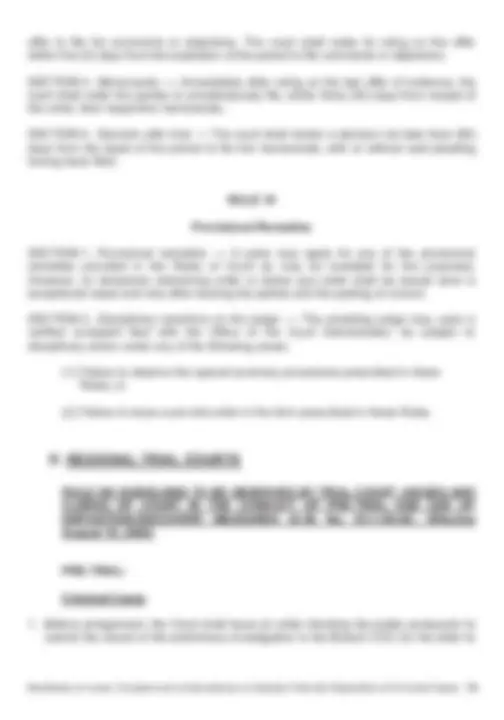
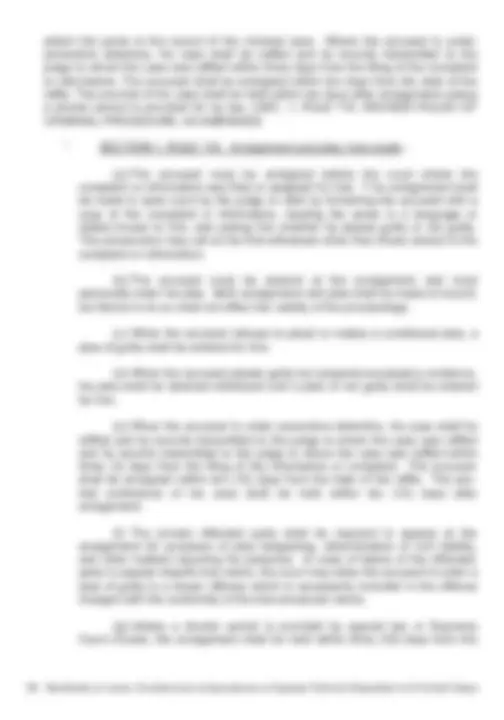
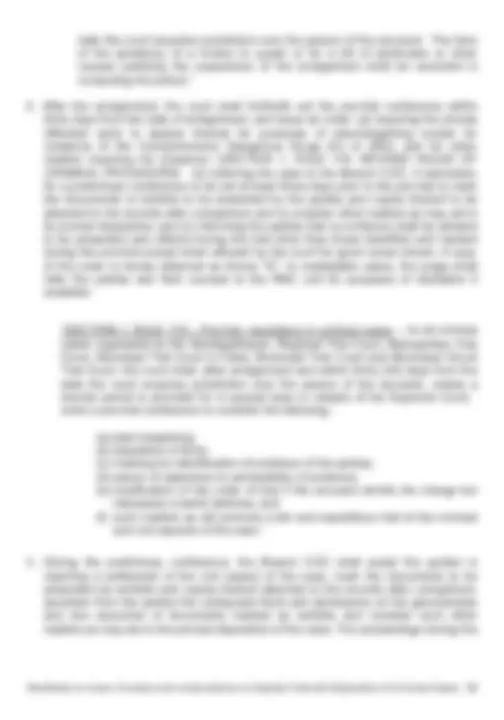
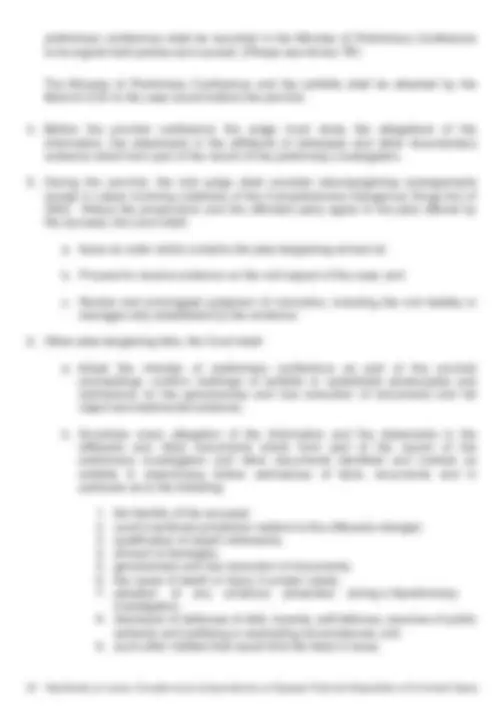
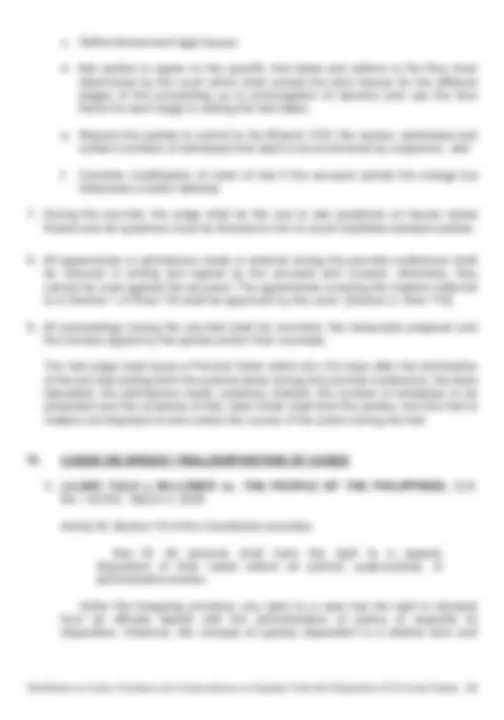
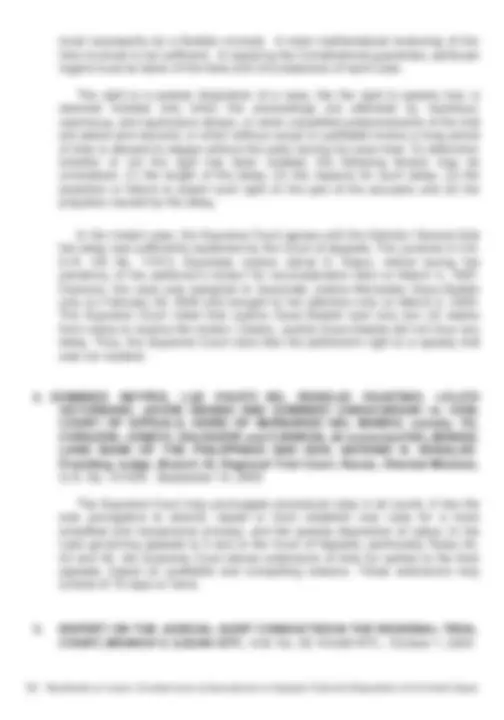
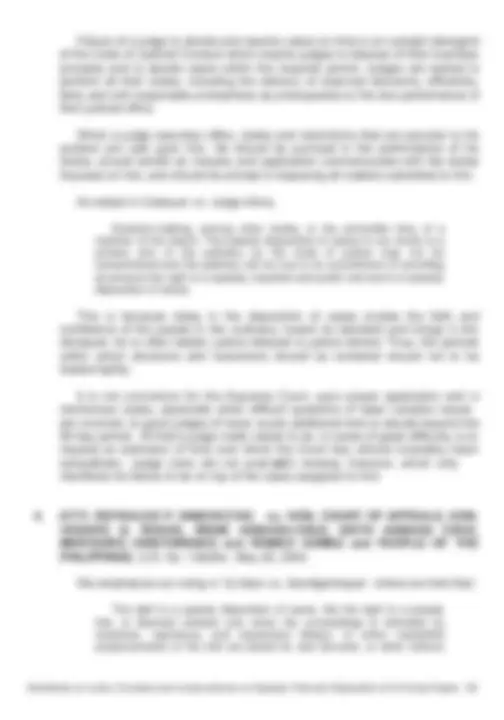
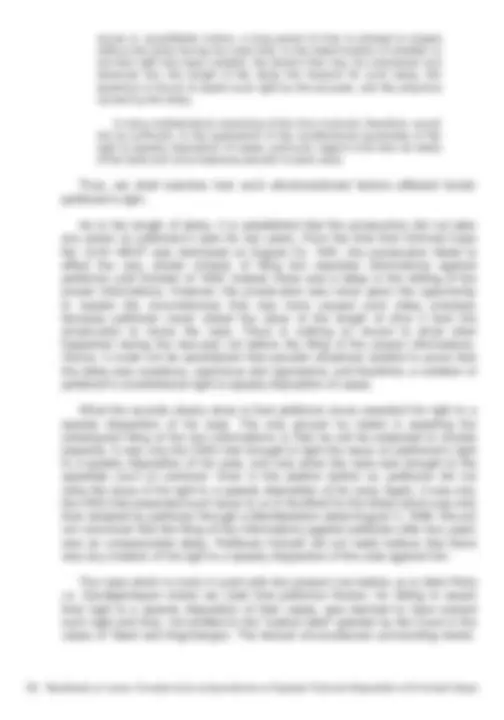
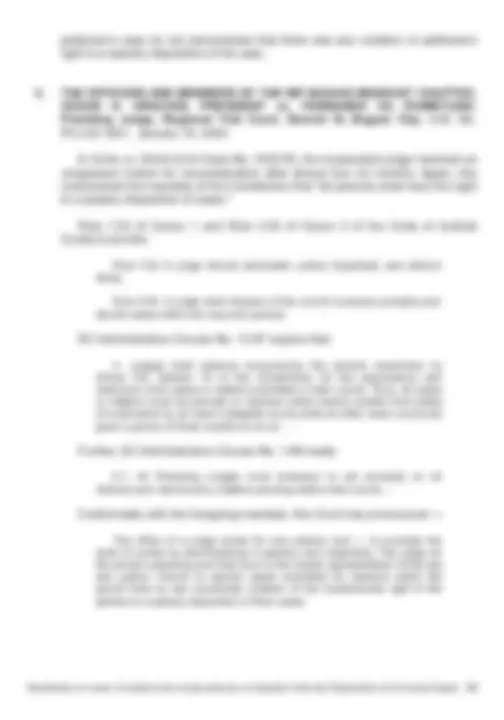
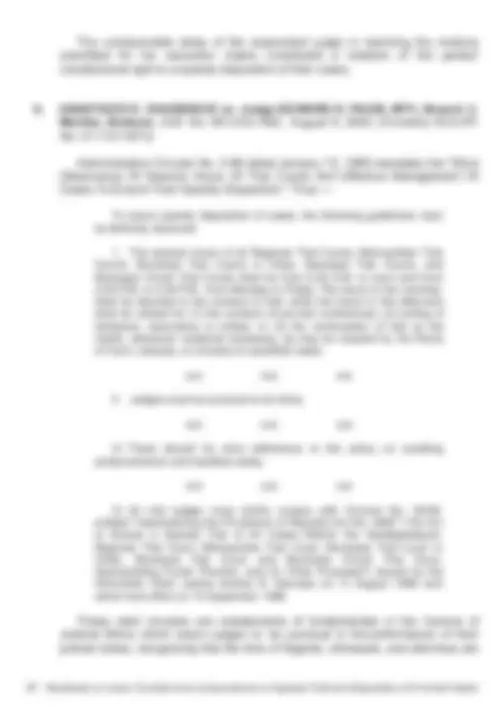
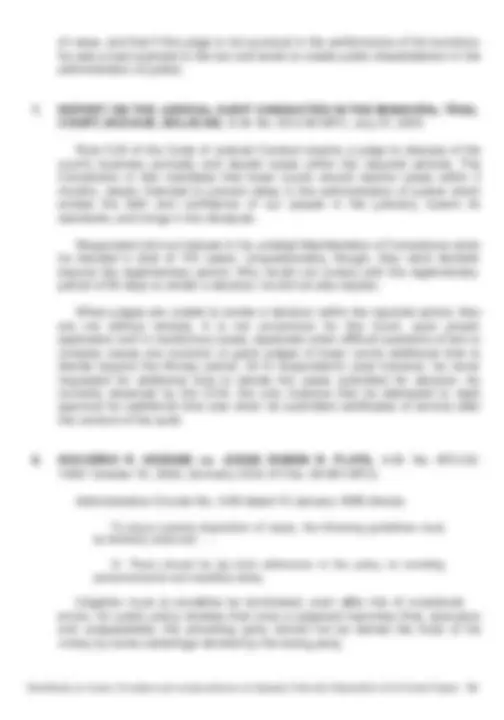
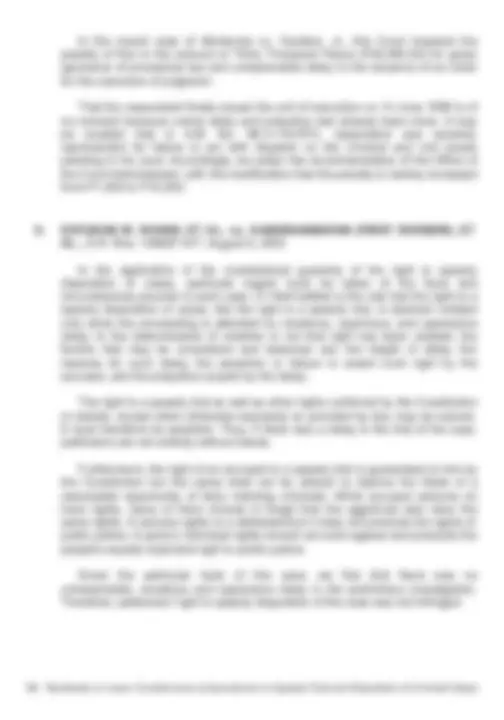
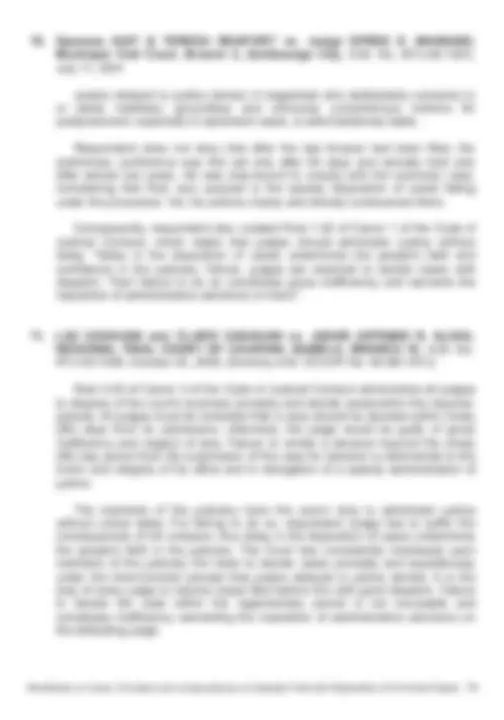
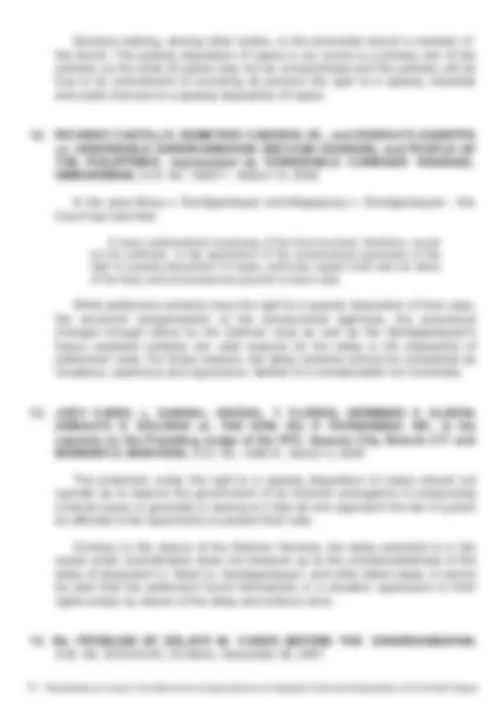
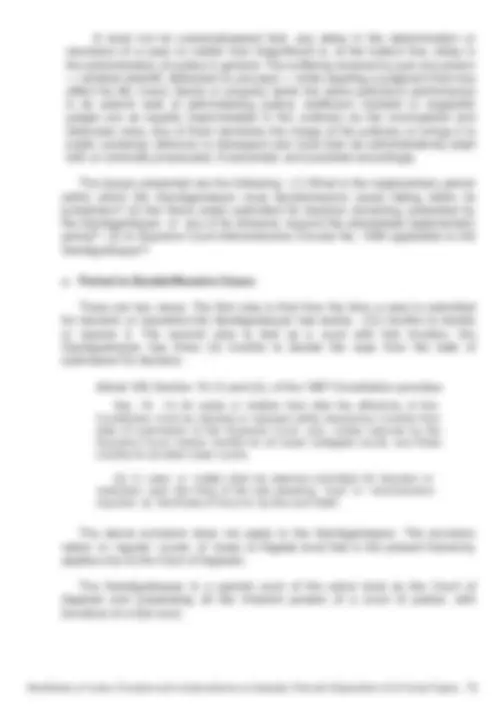
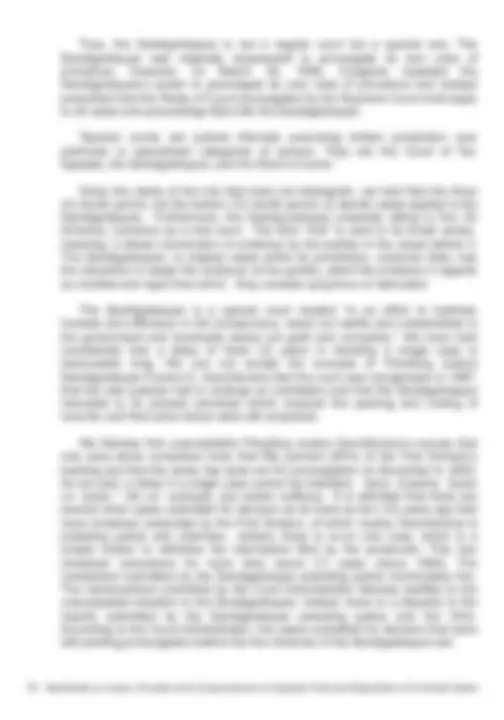
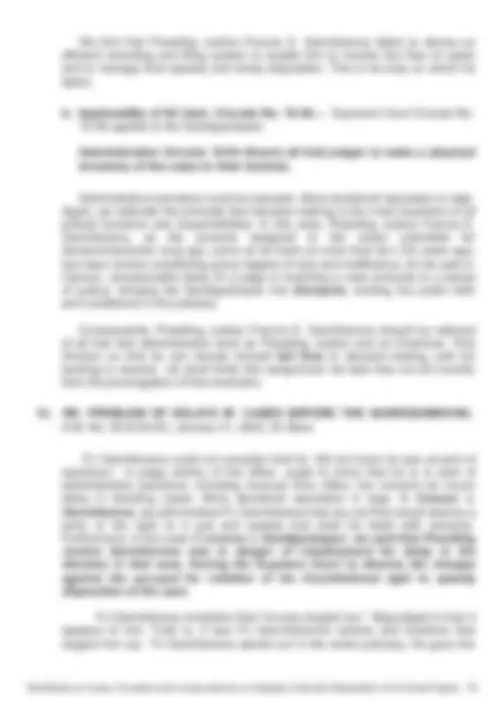
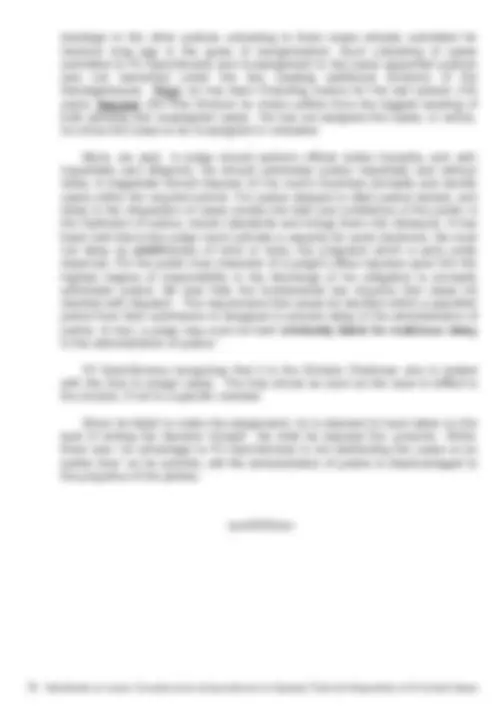

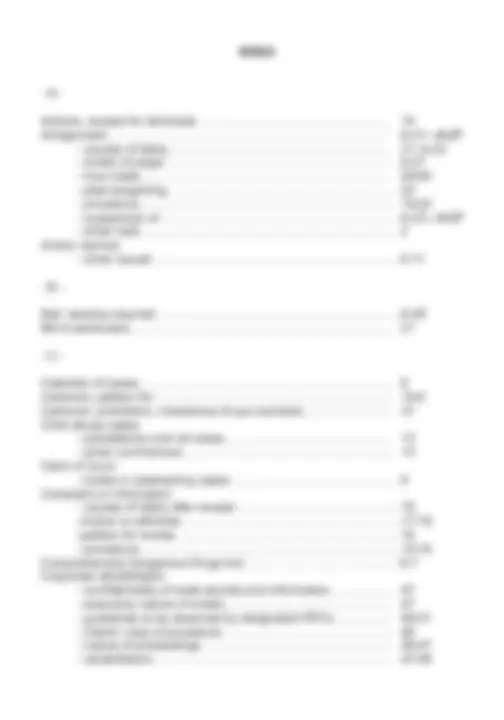
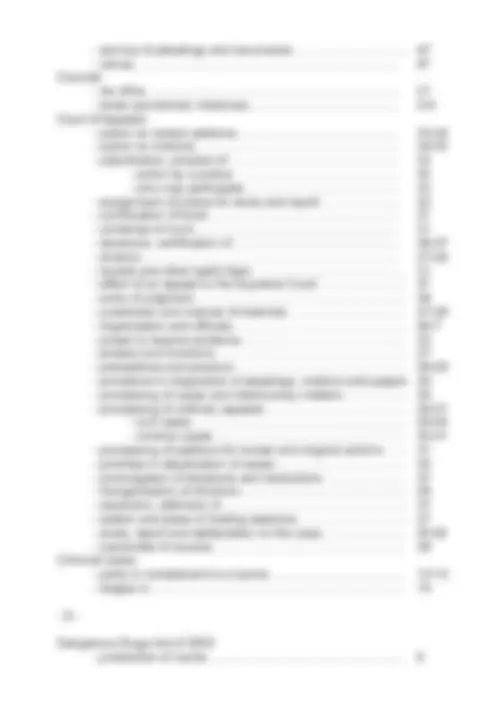
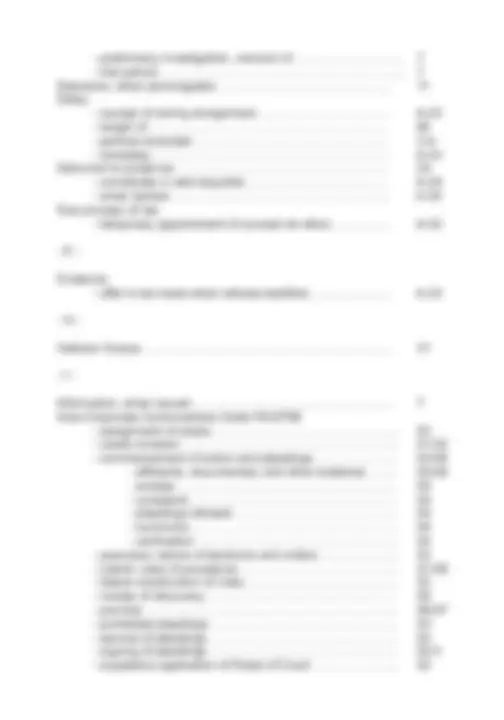
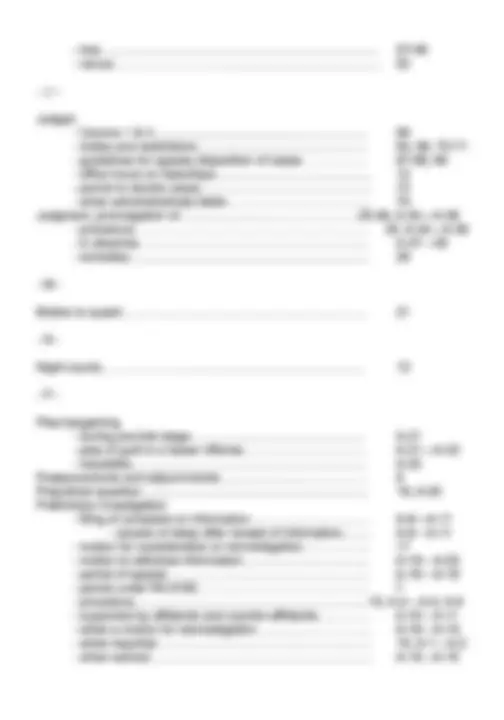
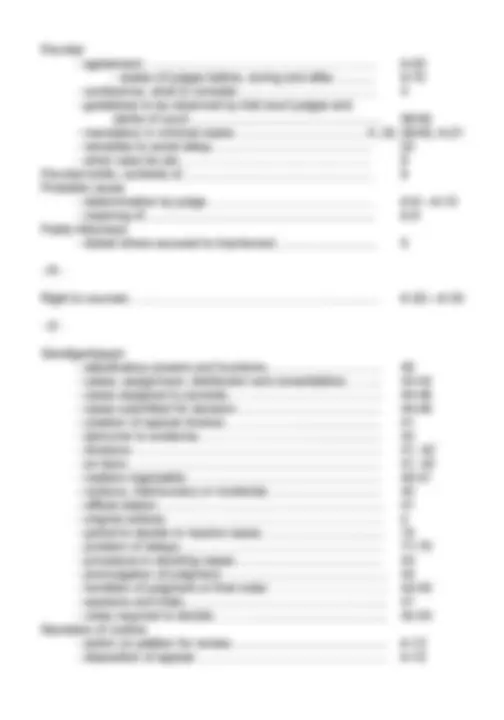
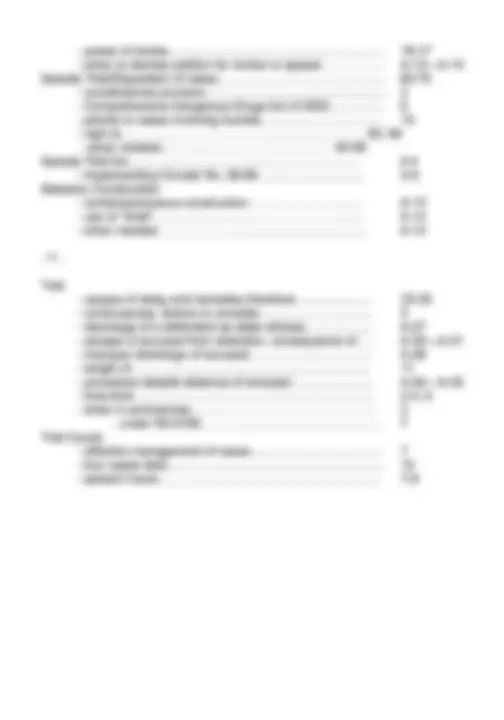
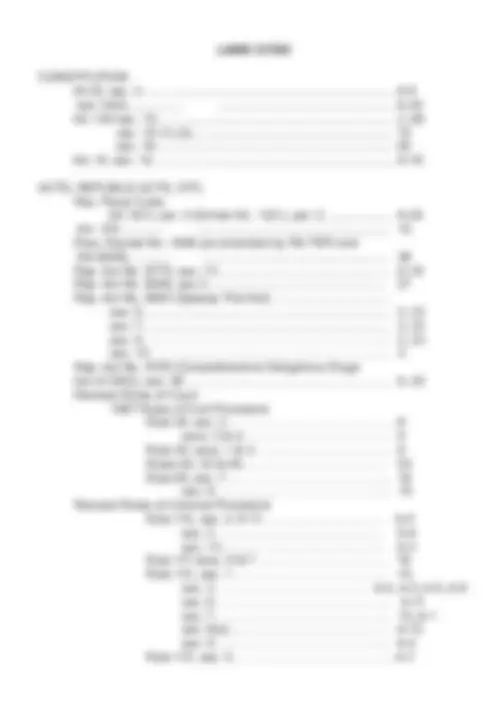
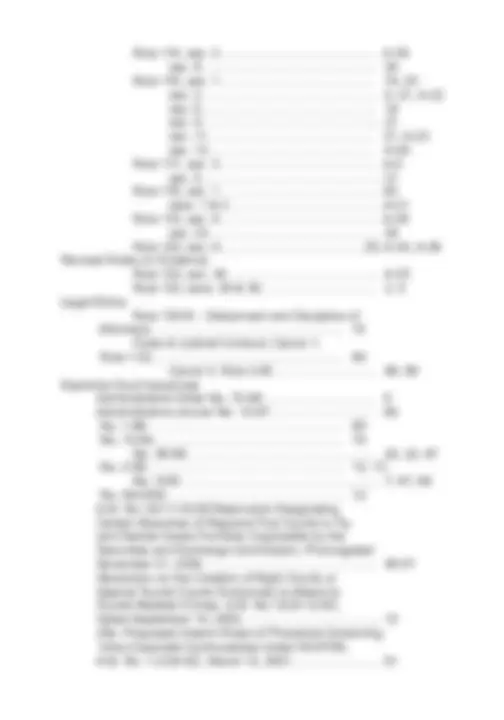
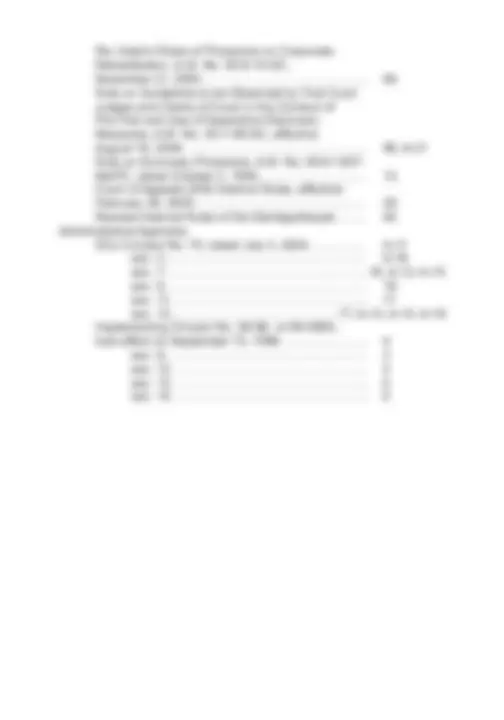
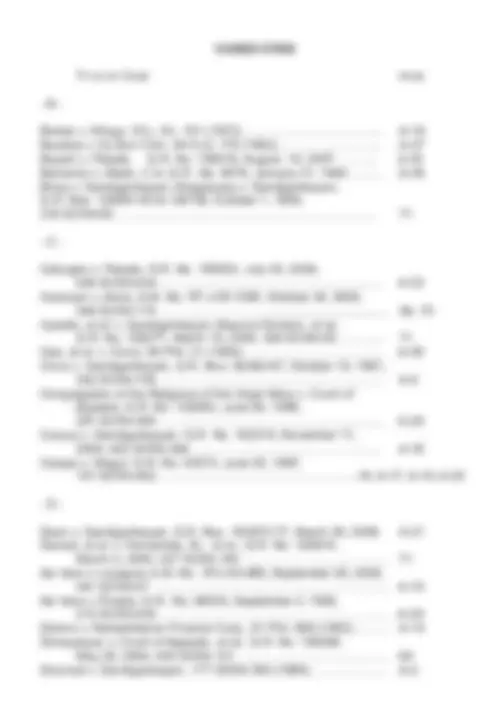
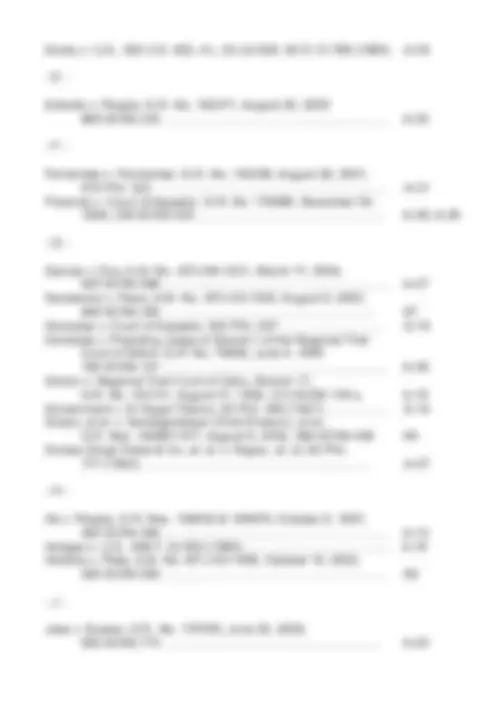
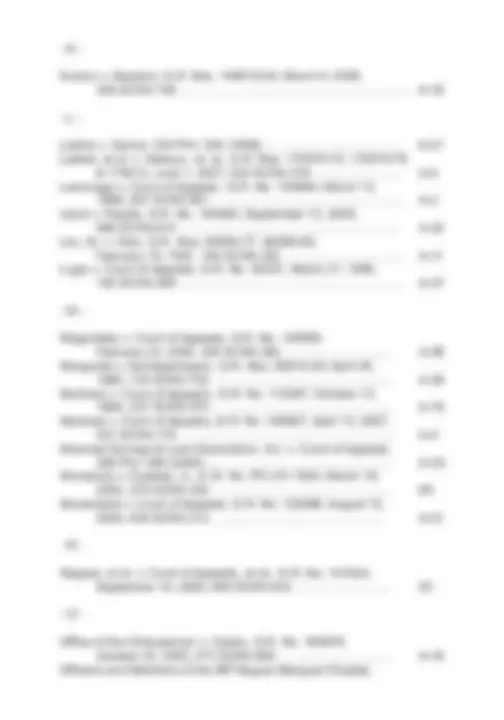
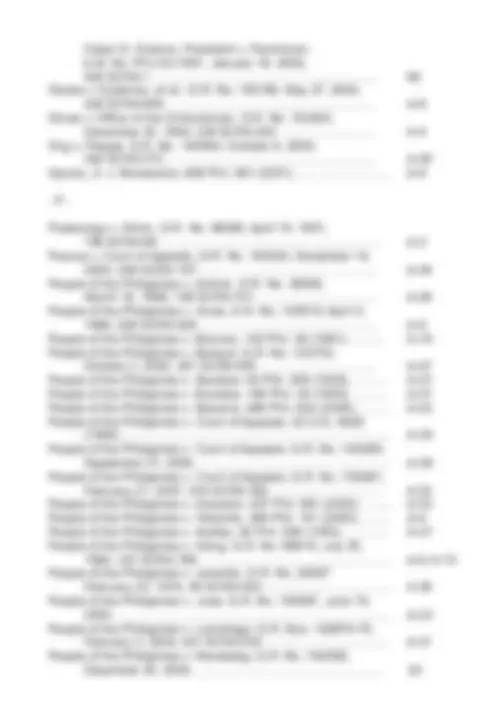
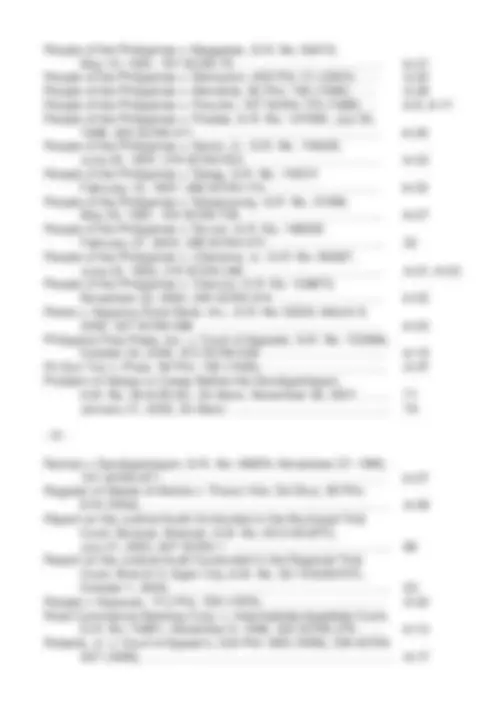
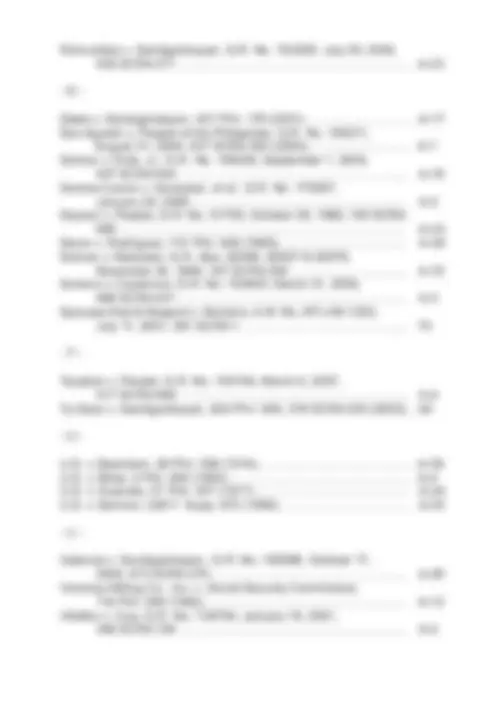
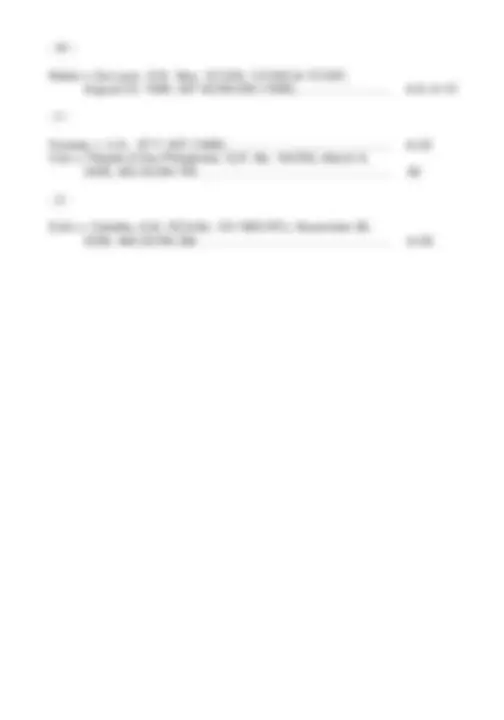


Study with the several resources on Docsity

Earn points by helping other students or get them with a premium plan


Prepare for your exams
Study with the several resources on Docsity

Earn points to download
Earn points by helping other students or get them with a premium plan
Community
Ask the community for help and clear up your study doubts
Discover the best universities in your country according to Docsity users
Free resources
Download our free guides on studying techniques, anxiety management strategies, and thesis advice from Docsity tutors
16 Issued January 15, 1999; took effect February 1, 1999. 7 Handbook on Laws, Circulars and Jurisprudence on Speedy Trial and Disposition of Criminal Cases. Contains 100+ pages
Typology: Lecture notes
1 / 100

This page cannot be seen from the preview
Don't miss anything!





























































































Part II – Original Actions……………………………………. 41 Rule IV – Sessions and Trials……………………………….. 41 Rule VII – Motions…………………………………………… 42 Rule VIII – Rendition of Judgment or Final Order……….. 42 Part IV – Provisions Common to Original and Appealed Cases and Petitions for Review……….. 43 Rule XII – Assignment, Distribution and Consolidation of Cases…………………………….. 43
C. Commercial and Intellectual Property Courts……………. 46
Rule 3 – General Provisions……………………….. 46 Rule 4 – Rehabilitation……………………………… 47
Appendix “A” – A.M. No. 00-11-03-SC, Resolution Designating Certain Branches Of Regional Trial Courts to Try and Decide Cases Formerly Cognizable by The Securities and Exchange Commission……… 49
Rule 1 – General Provisions………………………. 51 Rule 2 – Commencement of Action and Pleadings 53 Rule 3 – Modes of Discovery………………………. 56 Rule 4 – Pre-Trial……………………………………. 56 Rule 5 – Trial…………………………………………. 57 Rule 10 – Provisional Remedies…………………… 58
D. Regional Trial Courts………………………………………… 58
Pre-Trial: Criminal Cases…………………………………… 58
VI. CASES ON SPEEDY TRIAL/DISPOSITION OF CASES……….. 62
I. CONSTITUTIONAL PROVISION ON SPEEDY TRIAL
Section 15, Article VIII of the 1987 Constitution of the Philippines provides: “(1) All cases or matters filed after the effectivity of this Constitution must be decided or resolved within twenty-four months from date of submission for the Supreme Court, and, unless reduced by the Supreme Court, twelve months for all lower collegiate courts, and three months for all other lower courts.”
II. PERTINENT LAWS ON SPEEDY TRIAL/DISPOSITION OF CASES
A. REPUBLIC ACT NO. 8493 ( The Speedy Trial Act )
A: R.A. No. 8493 (The Speedy Trial Act),which took effect on February 12, 1998, ensures the speedy trial of all criminal cases.
A: The Act applies to cases tried before the Sandiganbayan, Regional Trial Court, Metropolitan Trial Court, Municipal Trial C ourt, and Municipal Circuit Trial Court.
A: The arraignment of an accused shall be held within thirty (30) days from the filing of the information, or from the date the accused has appeared before the justice, judge or court in which the charge is pending, whichever date last occurs.^1
A: In no case shall the entire tria l period exceed one hundred eighty (180) days from the first day of trial, except as otherwise authorized by the Chief Justice of the Supreme Court pursuant to Section 3, Rule 22 of the Rules of Court.^2
A: Where a plea of not guilty is entered, the accused shall have at least fifteen (15) days to prepare for trial. Trial shall commence within thirty (30) days from arraignment as fixed by the court.^3
(^1) Section 7, R.A. No. 8493 (^2) Section 6, R.A. No. 8493 (^3) Section 7, R.A. No. 8493
Handbook on Laws, Circulars and Jurisprudence on Speedy Trial and Disposition of Criminal Cases 2
A: For the first twelve-calendar-month period following the effectivity of the Act, the time limit with respect to the period from the arraignment to the trial shall be one hundred eighty (180) days. For the second twelve-month period, the time limit shall be one hundred twenty (120) days, and, for the third twelve-month period, the time limit with respect to the period from the arraignment to the trial shall be eighty (80) days.^4
A: The following periods of delay are to be excluded:
(a) Any period of delay resulting from other proceedings concerning the accused, including but not limited to the following:
(1) delay resulting from an examination of the accused, and hearing on his/her mental competency, or physical incapacity; (2) delay resulting from trials with respect to charges against the accused; (3) delay resulting from interlocutory appeals; (4) delay resulting from hearings on pre-trial motions: provided that the delay does not exceed thirty (30) days, (5) delay resulting from orders of inhibition, or proceedings relating to change of venue of cases or transfer from other courts; (6) delay resulting from a finding of the existence of a valid prejudicial question; and (7) delay reasonably attributable to any period, not to exceed thirty (30) days, during which any proceeding concerning the accused is actually under advisement.^5
(b) Any period of delay resulting from the absence or unavailability of the accused or an essential witness. (c) Any period of delay resulting from the fact that the accused is mentally incompetent or physically unable to stand trial. (d) If the information is dismissed upon motion of the prosecution and thereafter a charge is filed against the accused for the same offense, or any offense required to be joined with that offense, any period of delay from the date the charge was dismissed to the date the time limitation would commence to run as to the subsequent charge had there been no previous charge.
(^4) Section 9, R.A. No. 8493 (^5) Section 10, R.A. No. 8493
3 Handbook on Laws, Circulars and Jurisprudence on Speedy Trial and Disposition of Criminal Cases
A: The following factors are considered:
(a) Whether or not the failure to grant a continuance in the proceeding would be likely to make a continuation of such proceeding impossible, or result in a miscarriage of justice; and (b) Whether or not the case taken as a whole is so novel, unusual and complex, due to the number of accused or the nature of the prosecution or otherwise, that it is unreasonable to expect adequate preparation within the period of time established herein.
No continuance under subparagraph (f) of Section 9 hereof shall be granted because of congestion of the court's calendar, or lack of diligent preparation or failure to obtain available witnesses on the part of the public prosecutor.^9
A: If the public attorney assigned to defend a person charged with a crime knows that the accused is preventively detained, either because he is charged with a bailable crime but has no means to post bail, or is charged with a non-bailable crime, or is serving a term of imprisonment in any penal institution:
(a) The public attorney shall promptly undertake to obtain the presence of the prisoner for trial, or cause a notice to be served on the person having custody of the prisoner requiring such person to so advise the prisoner of his right to demand trial. (b) Upon receipt of that notice, the person having custody of the prisoner shall promptly advise the prisoner of the charge and of his right to demand trial. If at anytime thereafter the prisoner informs his custodian that he demands such trial, the latter shall cause notice to that effect to be sent promptly to the public attorney. (c) Upon receipt of that notice, the public attorney shall promptly seek to obtain the presence of the prisoner for trial. (d) When the person having custody of t he prisoner receives from the public attorney a properly supported request for the availability of the prisoner for purposes of the trial, the prisoner shall be made available accordingly. 10
A: In any case in which private counsel for the accused, the public attorney or the public prosecutor:
(^9) Section 10, Circular No. 38- (^10) Section 12, Circular No. 38-
5 Handbook on Laws, Circulars and Jurisprudence on Speedy Trial and Disposition of Criminal Cases
(a) Knowingly allows the case to be set for trial without disclosing the fact that a necessary witness would be unavailable for trial; (b) Files a motion solely for the purpose of delay which he knows is totally frivolous and without merit; (c) Makes a statement for the purpose of obtaining continuance which he knows to be false and which is material to the granting of a continuance; or (d) Otherwise willfully fails to proceed to trial without justification consistent with the provision hereof, the court may punish any such counsel, attorney or prosecutor, as follows: (1) in the case of a counsel privately retained in connection with the defense of an accused, by imposing a fine not exceeding twenty thousand pesos (P20,000.00); (2) by imposing on any appointe d counsel de officio, public attorney or public prosecutor a fine not exceeding five thousand pesos (P5,000.00); and (3) by denying any defense counsel or public prosecutor the right to practice before the court considering the case for a period not exceeding thirty (30) days.^11
A: If the accused is not brought to trial within the time limit, the information may be dismissed on motion of the accused on the ground of denial of his right to speedy trial. The accused shall have the burden of proving such motion but the prosecution shall have the burden of going forward with the evidence in connection with the exclusion of time. The dismissal shall be subject to the rules on double jeopardy.
Failure of the accused to move for dismissal prior to trial shall constitute a waiver of the right to dismiss.^12
REPUBLIC ACT NO. 9165 ( Comprehensive Dangerous Drugs Act of 2002 )
A: Section 90 of R.A. No. 9165 provides that the Supreme Court shall designate special courts from among the existing Regional Trial Courts in each judicial region to exclusively try and hear cases involving violations of R.A. No. 9165.
(^11) Section 13, Circular No. 38- (^12) Section 14, Circular No. 38-
Handbook on Laws, Circulars and Jurisprudence on Speedy Trial and Disposition of Criminal Cases 6
A: The session hours of all Regional Trial Courts, Metropolitan Trial Courts, Municipal Trial Courts in Cities, Municipal Trial Court, and Municipal Circuit Trial Courts shall be from 8:30 A.M. to noon and from 2:00 P.M. to4:30 P.M., from Monday to Friday. The hoursin the morning s hall be devoted to the conduct of trial, while the hours in the afternoon shall be utilized for (1) the conduct of pre- trial conferences; (2) writing of decisions, resolutions, or orders; or (3) the continuation of trial on the merits whenever rendered necessary, as may be required by the Rules of Court, statutes, or circulars in specified cases.
However, in multi-sala courts in places where there are few practicing lawyers, the schedule may be modified upon request of the Integrated Bar of the Philippines such that one-half of the branches may holdtheir trial in the morning and the other half in the afternoon. Except those requiring immediate action, all motions should be scheduled for hearing on Friday afternoons, or if Friday is a non-working day, in the afternoon of the next business day. The unauthorized practice of some judges of entertaining motions or setting them for hearing on any other day or time must be immediately stopped.
A: The Clerk of Court, under the direct supervision of the Judge, must comply with Rule 20 of the 1997 Rules of Civil Procedure^17 regarding the calendar of cases.
A: Section 2 (adjournments and postponements), Section 3 (requisites of a motion to postpone trial for absence of evidence) and Section 4 (requisites of a motion to postpone trial for illness of a party or counsel) of Rule 30, 1997 Rules on Civil Procedure,^18 should be faithfully observed.
(^17) Rule 20. Calendar of Cases:
SECTION 1. Calendar of cases. — The clerk of court, under the direct supervision of the judge, shall keep a calendar of cases for pre-trial, for trial, those whose trials were adjourned or postponed, and those with motions to set for hearing. Preference shall be given to habeas corpus cases, election cases, special civil actions, and those so required by law. (1a, R22) SECTION 2. Assignment of cases. — The assignment of cases to the different branches of a court shall be done exclusively by raffle. The assignment shall be done in open session of which adequate notice shall be given so as to afford interested parties the opportunity to be present. (7a, R22) (^18) Rule 30. Trial:
SECTION 2. Adjournments and postponements. — A court may adjourn a trial from day to day, and to any stated time, as the expeditious and convenient transaction of business may require, but shall have no power to adjourn a trial for a longer period than one month for each adjournment, nor more than three months in all, except when authorized in writing by the Court Administrator, Supreme Court. (3a, R22)
Handbook on Laws, Circulars and Jurisprudence on Speedy Trial and Disposition of Criminal Cases 8
A: Within five (5) days after the last pleading joining the issues has been filed and served, the plaintiff must move ex parte that the case be set for pre-trial conference.
A: The pre-trial briefs should contain the following:
a. A statement of their willingness to enter into an amicable settlement indicating the desired terms thereof, or to submit the case to any of the alternative modes of dispute resolution; b. A summary of admitted facts and proposed stipulation of facts; c. The issues to be tried or resolved; d. The number and names of the witnesses to be presented, an abstract of their testimonies, and the approximate number of hours that will be required by the parties for the presentation of their respective evidence; e. Copies of all documents intended to be presented with a statement of the purpose of their offer; f. A manifestation of their having availed or their intention to avail themselves of any discovery procedure, or of the need of referral of any issues to commissioners; g. Applicable laws and jurisprudence; h. The available trial dates of counsel for complete presentation of evidence, which must be within a period of three months from the first day of trial.
A: The judge must study the pleadings of every case, and determine the issues thereof and the respective positions of the parties thereon to enable him to intelligently steer the parties toward a possible amicable settlement of the case or, at the very least, to help reduce and limit the issues. The judge should avoid the undesirable practice of terminating the pre-trial as soon as the parties have indicated that they cannot settle the controversy. He must be mindful that there
SECTION 3. Requisites of motion to postpone trial for absence of evidence. — A motion to postpone a trial on the ground of absence of evidence can be granted only upon affidavit showing the materiality or relevancy of such evidence, and that due diligence has been used to procure it. But if the adverse party admits the facts to be given in evidence, even if he objects or reserves the right to object to their admissibility, the trial shall not be postponed. (4a, R22) (Corrected by Bar Matter No. 803, Resolution of the Supreme Court dated July 21, 1998) SECTION 4. Requisites of motion to postpone trial for illness of party or counsel. — A motion to postpone a trial on the ground of illness of a party or counsel may be granted if it appears upon affidavit or sworn certification that the presence of such party or counsel at the trial is indispensable and that the character of his illness is such as to render his non-attendance excusable. (5a, R22)
9 Handbook on Laws, Circulars and Jurisprudence on Speedy Trial and Disposition of Criminal Cases
A: The judge shall conduct trial with utmost dispatch, with judicious exercise of the court’s power to control trial proceedings to avoid delay.
The judge must take notes of the material and relevant testimonies of witnesses to facilitate his decision making.
A: The trial shall be determined within ninety (90) days from initial hearing. Appropriate disciplinary sanctions may be imposed on the judge and the lawyers for failure to comply with this requirement due to causes attributable to them.
A: Each party is bound to complete the presentation of his evidence within the trial dates assigned to him. After the lapse of said dates, the party is deemed to have completed the presentation of evidence. However, upon verified motion based on compelling reasons, the judge may allow a party additional trial dates in the afternoon; provided that said extension will not go beyond the three-month limit computed from the first trial date except when authorized in writing by the Court Administrator, Supreme Court.
A: As a constant reminder of what cases must be decided or resolved, the judge must keep a calendar of cases submitted for decision, noting therein the exact day, month and year when the 90-day period is to expire. As soon as a case is submitted for decision, it must be noted in the calendar of the judge; moreover, the records shall be duly collected with the exhibits and the transcripts of stenographic notes, as well as the trial notes of the judge, and placed in the judge's chamber.
A: The date of the promulgation of the decision should be set within ninety (90) days from the submission of the case for decision.
11 Handbook on Laws, Circulars and Jurisprudence on Speedy Trial and Disposition of Criminal Cases
B. ADMINISTRATIVE CIRCULAR No. 58-2002^19
A: This Circular requires the speedy disposition of cases of all persons before judicial bodies, as mandated by the Constitution. It also gives priority to cases involving tourists, whose stay in the country is temporary or for a short time only.
A: The Supreme Court has adopted the following measures:
(a) The reopening/revival of night courts in the Metropolitan Trial Court of Manila “to try and decide all special cases enumerated in the Rule on Summary Procedure” under Administrative Order No. 72 dated 30 June 1988; and (b) The opening of two branches of the Metropolitan Trial Court of Quezon City as night courts to be assigned “cases involving nighttime apprehensions” and “special cases enumerated in the Rule on Summary Procedure” under the Resolution of 2 October 1990 in A.M. No. 90-9-1437-MeTC.^20
Note - Administrative Circular No. 2-99 dated 15 January 1999 also requires (1) judges, assisted by a skeletal force of personnel, to be on duty, on rotation basis, from 8:00 a.m. to 1:00 p.m. on Saturdays to act on petitions for bail and other urgent matters, as well as to act on bailable offenses on Saturday afternoons, Sundays and non-working holidays; and (2) court offices and units that deal directly with the public to provide for a skeletal force of personnel from 8:00 a.m. to 12:00 noon and 12:30 to 4:30 p.m. on Saturdays.
A: Pursuant to the Resolution of 10 September 2002 in A.M. No. 02-8-12-SC,^21 the Supreme Court directs that:
(^19) Issued November 14, 2002 (^20) Re Request for the Opening of Two Branches of the Metropolitan Trial Court to Conduct
Night Sessions (^21) Re: In the Matter of the Creation of Night Courts or Special Tourist Courts Exclusively to
Attend to Tourist-Related Crimes
Handbook on Laws, Circulars and Jurisprudence on Speedy Trial and Disposition of Criminal Cases 12